Essentials of Mentorship in Nursing: Strategies for Effective Teaching and Learning
VerifiedAdded on 2023/06/07
|18
|5121
|408
AI Summary
This essay analyses and evaluates the essential aspects of mentorship in nursing and the value of effective mentorship towards optimizing the efficiency of new recruits in the nursing profession. It discusses various learning and teaching theories and the importance of emotional intelligence in nursing.
Contribute Materials
Your contribution can guide someone’s learning journey. Share your
documents today.
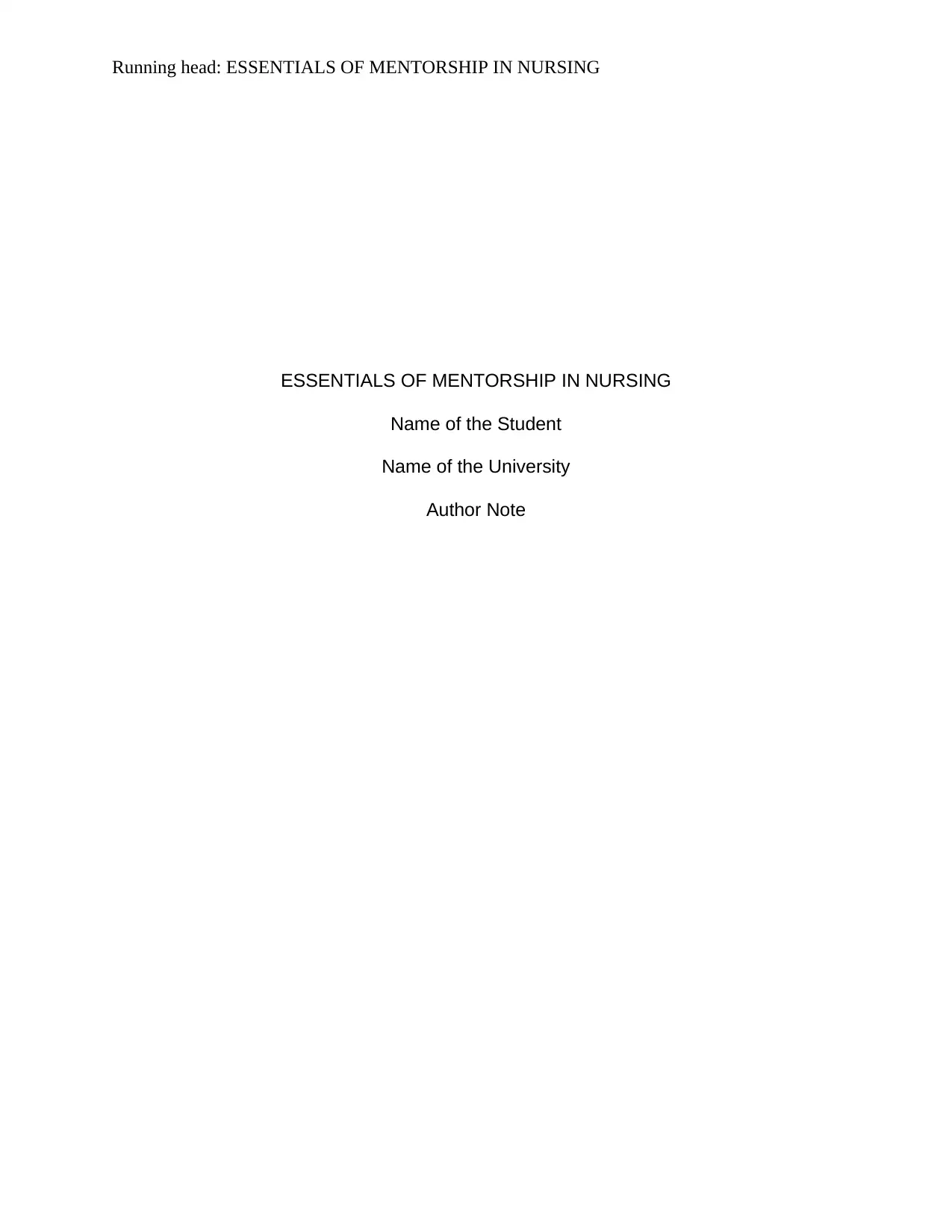
Running head: ESSENTIALS OF MENTORSHIP IN NURSING
ESSENTIALS OF MENTORSHIP IN NURSING
Name of the Student
Name of the University
Author Note
ESSENTIALS OF MENTORSHIP IN NURSING
Name of the Student
Name of the University
Author Note
Secure Best Marks with AI Grader
Need help grading? Try our AI Grader for instant feedback on your assignments.
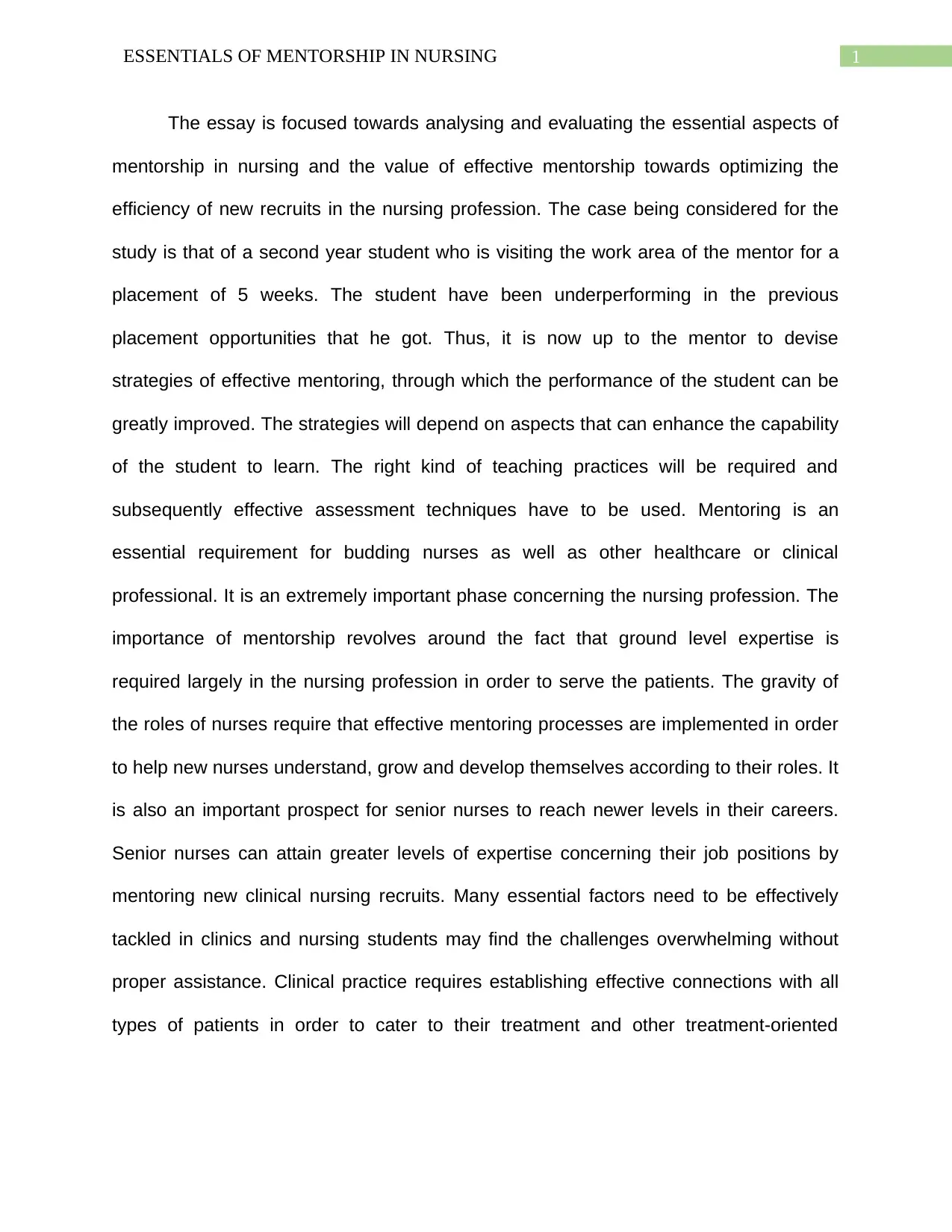
1ESSENTIALS OF MENTORSHIP IN NURSING
The essay is focused towards analysing and evaluating the essential aspects of
mentorship in nursing and the value of effective mentorship towards optimizing the
efficiency of new recruits in the nursing profession. The case being considered for the
study is that of a second year student who is visiting the work area of the mentor for a
placement of 5 weeks. The student have been underperforming in the previous
placement opportunities that he got. Thus, it is now up to the mentor to devise
strategies of effective mentoring, through which the performance of the student can be
greatly improved. The strategies will depend on aspects that can enhance the capability
of the student to learn. The right kind of teaching practices will be required and
subsequently effective assessment techniques have to be used. Mentoring is an
essential requirement for budding nurses as well as other healthcare or clinical
professional. It is an extremely important phase concerning the nursing profession. The
importance of mentorship revolves around the fact that ground level expertise is
required largely in the nursing profession in order to serve the patients. The gravity of
the roles of nurses require that effective mentoring processes are implemented in order
to help new nurses understand, grow and develop themselves according to their roles. It
is also an important prospect for senior nurses to reach newer levels in their careers.
Senior nurses can attain greater levels of expertise concerning their job positions by
mentoring new clinical nursing recruits. Many essential factors need to be effectively
tackled in clinics and nursing students may find the challenges overwhelming without
proper assistance. Clinical practice requires establishing effective connections with all
types of patients in order to cater to their treatment and other treatment-oriented
The essay is focused towards analysing and evaluating the essential aspects of
mentorship in nursing and the value of effective mentorship towards optimizing the
efficiency of new recruits in the nursing profession. The case being considered for the
study is that of a second year student who is visiting the work area of the mentor for a
placement of 5 weeks. The student have been underperforming in the previous
placement opportunities that he got. Thus, it is now up to the mentor to devise
strategies of effective mentoring, through which the performance of the student can be
greatly improved. The strategies will depend on aspects that can enhance the capability
of the student to learn. The right kind of teaching practices will be required and
subsequently effective assessment techniques have to be used. Mentoring is an
essential requirement for budding nurses as well as other healthcare or clinical
professional. It is an extremely important phase concerning the nursing profession. The
importance of mentorship revolves around the fact that ground level expertise is
required largely in the nursing profession in order to serve the patients. The gravity of
the roles of nurses require that effective mentoring processes are implemented in order
to help new nurses understand, grow and develop themselves according to their roles. It
is also an important prospect for senior nurses to reach newer levels in their careers.
Senior nurses can attain greater levels of expertise concerning their job positions by
mentoring new clinical nursing recruits. Many essential factors need to be effectively
tackled in clinics and nursing students may find the challenges overwhelming without
proper assistance. Clinical practice requires establishing effective connections with all
types of patients in order to cater to their treatment and other treatment-oriented
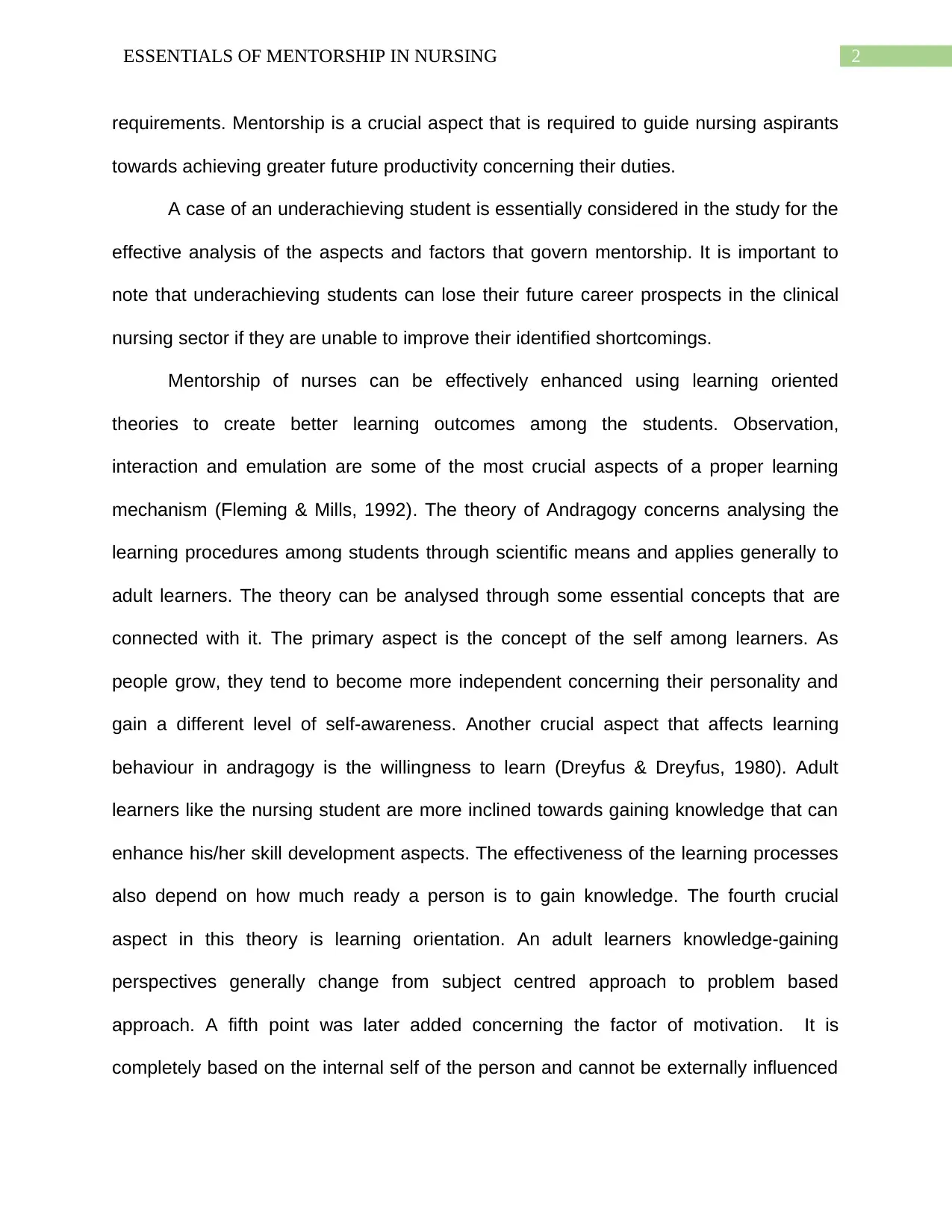
2ESSENTIALS OF MENTORSHIP IN NURSING
requirements. Mentorship is a crucial aspect that is required to guide nursing aspirants
towards achieving greater future productivity concerning their duties.
A case of an underachieving student is essentially considered in the study for the
effective analysis of the aspects and factors that govern mentorship. It is important to
note that underachieving students can lose their future career prospects in the clinical
nursing sector if they are unable to improve their identified shortcomings.
Mentorship of nurses can be effectively enhanced using learning oriented
theories to create better learning outcomes among the students. Observation,
interaction and emulation are some of the most crucial aspects of a proper learning
mechanism (Fleming & Mills, 1992). The theory of Andragogy concerns analysing the
learning procedures among students through scientific means and applies generally to
adult learners. The theory can be analysed through some essential concepts that are
connected with it. The primary aspect is the concept of the self among learners. As
people grow, they tend to become more independent concerning their personality and
gain a different level of self-awareness. Another crucial aspect that affects learning
behaviour in andragogy is the willingness to learn (Dreyfus & Dreyfus, 1980). Adult
learners like the nursing student are more inclined towards gaining knowledge that can
enhance his/her skill development aspects. The effectiveness of the learning processes
also depend on how much ready a person is to gain knowledge. The fourth crucial
aspect in this theory is learning orientation. An adult learners knowledge-gaining
perspectives generally change from subject centred approach to problem based
approach. A fifth point was later added concerning the factor of motivation. It is
completely based on the internal self of the person and cannot be externally influenced
requirements. Mentorship is a crucial aspect that is required to guide nursing aspirants
towards achieving greater future productivity concerning their duties.
A case of an underachieving student is essentially considered in the study for the
effective analysis of the aspects and factors that govern mentorship. It is important to
note that underachieving students can lose their future career prospects in the clinical
nursing sector if they are unable to improve their identified shortcomings.
Mentorship of nurses can be effectively enhanced using learning oriented
theories to create better learning outcomes among the students. Observation,
interaction and emulation are some of the most crucial aspects of a proper learning
mechanism (Fleming & Mills, 1992). The theory of Andragogy concerns analysing the
learning procedures among students through scientific means and applies generally to
adult learners. The theory can be analysed through some essential concepts that are
connected with it. The primary aspect is the concept of the self among learners. As
people grow, they tend to become more independent concerning their personality and
gain a different level of self-awareness. Another crucial aspect that affects learning
behaviour in andragogy is the willingness to learn (Dreyfus & Dreyfus, 1980). Adult
learners like the nursing student are more inclined towards gaining knowledge that can
enhance his/her skill development aspects. The effectiveness of the learning processes
also depend on how much ready a person is to gain knowledge. The fourth crucial
aspect in this theory is learning orientation. An adult learners knowledge-gaining
perspectives generally change from subject centred approach to problem based
approach. A fifth point was later added concerning the factor of motivation. It is
completely based on the internal self of the person and cannot be externally influenced
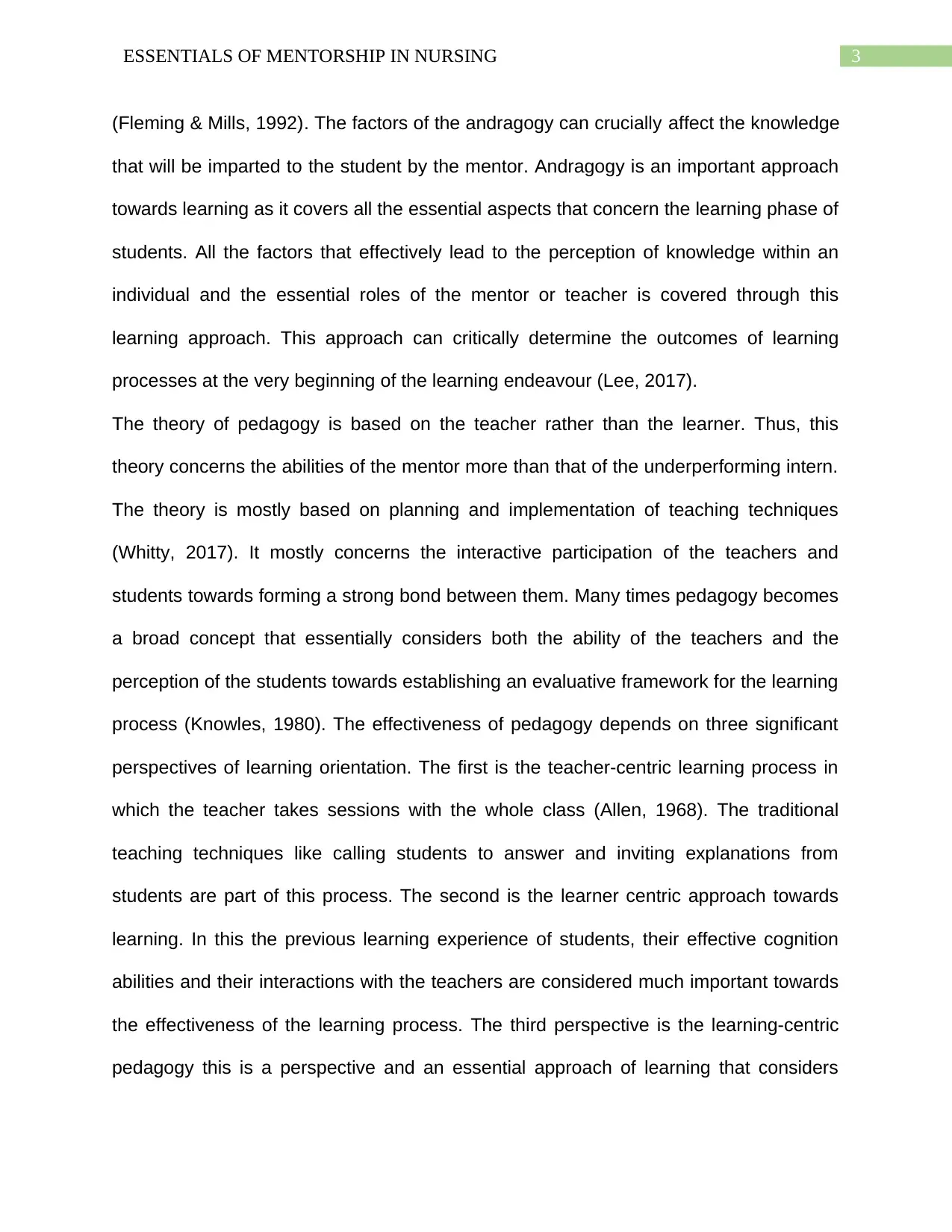
3ESSENTIALS OF MENTORSHIP IN NURSING
(Fleming & Mills, 1992). The factors of the andragogy can crucially affect the knowledge
that will be imparted to the student by the mentor. Andragogy is an important approach
towards learning as it covers all the essential aspects that concern the learning phase of
students. All the factors that effectively lead to the perception of knowledge within an
individual and the essential roles of the mentor or teacher is covered through this
learning approach. This approach can critically determine the outcomes of learning
processes at the very beginning of the learning endeavour (Lee, 2017).
The theory of pedagogy is based on the teacher rather than the learner. Thus, this
theory concerns the abilities of the mentor more than that of the underperforming intern.
The theory is mostly based on planning and implementation of teaching techniques
(Whitty, 2017). It mostly concerns the interactive participation of the teachers and
students towards forming a strong bond between them. Many times pedagogy becomes
a broad concept that essentially considers both the ability of the teachers and the
perception of the students towards establishing an evaluative framework for the learning
process (Knowles, 1980). The effectiveness of pedagogy depends on three significant
perspectives of learning orientation. The first is the teacher-centric learning process in
which the teacher takes sessions with the whole class (Allen, 1968). The traditional
teaching techniques like calling students to answer and inviting explanations from
students are part of this process. The second is the learner centric approach towards
learning. In this the previous learning experience of students, their effective cognition
abilities and their interactions with the teachers are considered much important towards
the effectiveness of the learning process. The third perspective is the learning-centric
pedagogy this is a perspective and an essential approach of learning that considers
(Fleming & Mills, 1992). The factors of the andragogy can crucially affect the knowledge
that will be imparted to the student by the mentor. Andragogy is an important approach
towards learning as it covers all the essential aspects that concern the learning phase of
students. All the factors that effectively lead to the perception of knowledge within an
individual and the essential roles of the mentor or teacher is covered through this
learning approach. This approach can critically determine the outcomes of learning
processes at the very beginning of the learning endeavour (Lee, 2017).
The theory of pedagogy is based on the teacher rather than the learner. Thus, this
theory concerns the abilities of the mentor more than that of the underperforming intern.
The theory is mostly based on planning and implementation of teaching techniques
(Whitty, 2017). It mostly concerns the interactive participation of the teachers and
students towards forming a strong bond between them. Many times pedagogy becomes
a broad concept that essentially considers both the ability of the teachers and the
perception of the students towards establishing an evaluative framework for the learning
process (Knowles, 1980). The effectiveness of pedagogy depends on three significant
perspectives of learning orientation. The first is the teacher-centric learning process in
which the teacher takes sessions with the whole class (Allen, 1968). The traditional
teaching techniques like calling students to answer and inviting explanations from
students are part of this process. The second is the learner centric approach towards
learning. In this the previous learning experience of students, their effective cognition
abilities and their interactions with the teachers are considered much important towards
the effectiveness of the learning process. The third perspective is the learning-centric
pedagogy this is a perspective and an essential approach of learning that considers
Secure Best Marks with AI Grader
Need help grading? Try our AI Grader for instant feedback on your assignments.
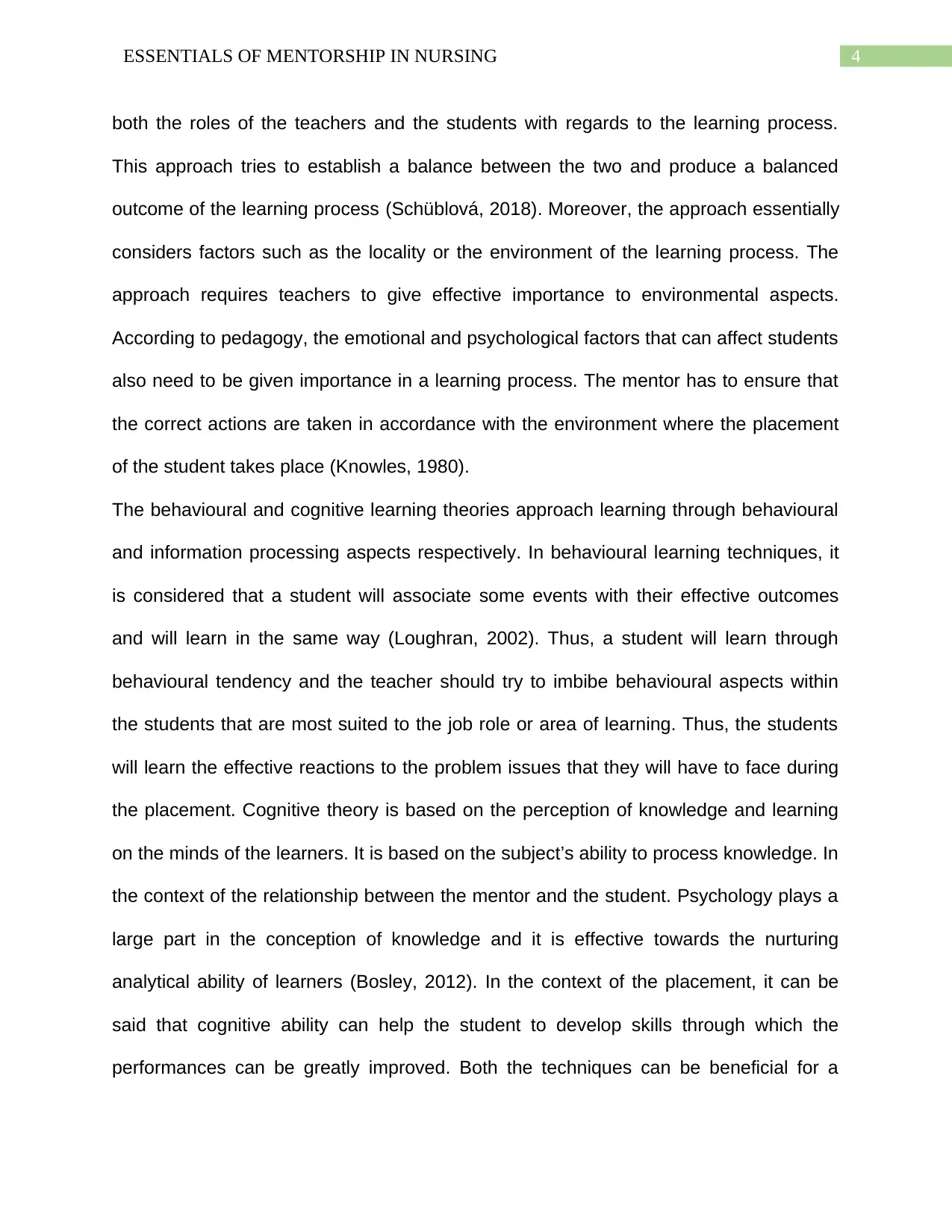
4ESSENTIALS OF MENTORSHIP IN NURSING
both the roles of the teachers and the students with regards to the learning process.
This approach tries to establish a balance between the two and produce a balanced
outcome of the learning process (Schüblová, 2018). Moreover, the approach essentially
considers factors such as the locality or the environment of the learning process. The
approach requires teachers to give effective importance to environmental aspects.
According to pedagogy, the emotional and psychological factors that can affect students
also need to be given importance in a learning process. The mentor has to ensure that
the correct actions are taken in accordance with the environment where the placement
of the student takes place (Knowles, 1980).
The behavioural and cognitive learning theories approach learning through behavioural
and information processing aspects respectively. In behavioural learning techniques, it
is considered that a student will associate some events with their effective outcomes
and will learn in the same way (Loughran, 2002). Thus, a student will learn through
behavioural tendency and the teacher should try to imbibe behavioural aspects within
the students that are most suited to the job role or area of learning. Thus, the students
will learn the effective reactions to the problem issues that they will have to face during
the placement. Cognitive theory is based on the perception of knowledge and learning
on the minds of the learners. It is based on the subject’s ability to process knowledge. In
the context of the relationship between the mentor and the student. Psychology plays a
large part in the conception of knowledge and it is effective towards the nurturing
analytical ability of learners (Bosley, 2012). In the context of the placement, it can be
said that cognitive ability can help the student to develop skills through which the
performances can be greatly improved. Both the techniques can be beneficial for a
both the roles of the teachers and the students with regards to the learning process.
This approach tries to establish a balance between the two and produce a balanced
outcome of the learning process (Schüblová, 2018). Moreover, the approach essentially
considers factors such as the locality or the environment of the learning process. The
approach requires teachers to give effective importance to environmental aspects.
According to pedagogy, the emotional and psychological factors that can affect students
also need to be given importance in a learning process. The mentor has to ensure that
the correct actions are taken in accordance with the environment where the placement
of the student takes place (Knowles, 1980).
The behavioural and cognitive learning theories approach learning through behavioural
and information processing aspects respectively. In behavioural learning techniques, it
is considered that a student will associate some events with their effective outcomes
and will learn in the same way (Loughran, 2002). Thus, a student will learn through
behavioural tendency and the teacher should try to imbibe behavioural aspects within
the students that are most suited to the job role or area of learning. Thus, the students
will learn the effective reactions to the problem issues that they will have to face during
the placement. Cognitive theory is based on the perception of knowledge and learning
on the minds of the learners. It is based on the subject’s ability to process knowledge. In
the context of the relationship between the mentor and the student. Psychology plays a
large part in the conception of knowledge and it is effective towards the nurturing
analytical ability of learners (Bosley, 2012). In the context of the placement, it can be
said that cognitive ability can help the student to develop skills through which the
performances can be greatly improved. Both the techniques can be beneficial for a
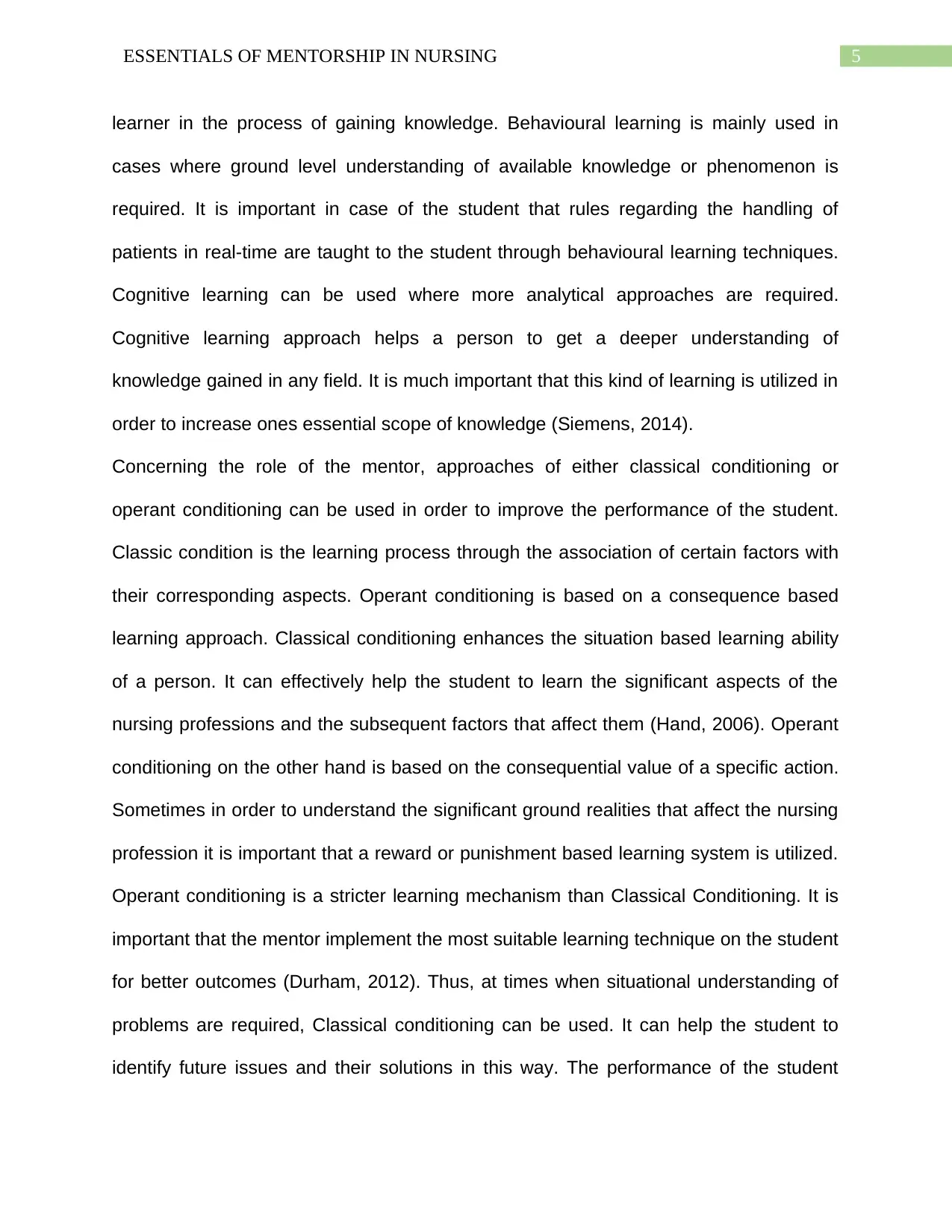
5ESSENTIALS OF MENTORSHIP IN NURSING
learner in the process of gaining knowledge. Behavioural learning is mainly used in
cases where ground level understanding of available knowledge or phenomenon is
required. It is important in case of the student that rules regarding the handling of
patients in real-time are taught to the student through behavioural learning techniques.
Cognitive learning can be used where more analytical approaches are required.
Cognitive learning approach helps a person to get a deeper understanding of
knowledge gained in any field. It is much important that this kind of learning is utilized in
order to increase ones essential scope of knowledge (Siemens, 2014).
Concerning the role of the mentor, approaches of either classical conditioning or
operant conditioning can be used in order to improve the performance of the student.
Classic condition is the learning process through the association of certain factors with
their corresponding aspects. Operant conditioning is based on a consequence based
learning approach. Classical conditioning enhances the situation based learning ability
of a person. It can effectively help the student to learn the significant aspects of the
nursing professions and the subsequent factors that affect them (Hand, 2006). Operant
conditioning on the other hand is based on the consequential value of a specific action.
Sometimes in order to understand the significant ground realities that affect the nursing
profession it is important that a reward or punishment based learning system is utilized.
Operant conditioning is a stricter learning mechanism than Classical Conditioning. It is
important that the mentor implement the most suitable learning technique on the student
for better outcomes (Durham, 2012). Thus, at times when situational understanding of
problems are required, Classical conditioning can be used. It can help the student to
identify future issues and their solutions in this way. The performance of the student
learner in the process of gaining knowledge. Behavioural learning is mainly used in
cases where ground level understanding of available knowledge or phenomenon is
required. It is important in case of the student that rules regarding the handling of
patients in real-time are taught to the student through behavioural learning techniques.
Cognitive learning can be used where more analytical approaches are required.
Cognitive learning approach helps a person to get a deeper understanding of
knowledge gained in any field. It is much important that this kind of learning is utilized in
order to increase ones essential scope of knowledge (Siemens, 2014).
Concerning the role of the mentor, approaches of either classical conditioning or
operant conditioning can be used in order to improve the performance of the student.
Classic condition is the learning process through the association of certain factors with
their corresponding aspects. Operant conditioning is based on a consequence based
learning approach. Classical conditioning enhances the situation based learning ability
of a person. It can effectively help the student to learn the significant aspects of the
nursing professions and the subsequent factors that affect them (Hand, 2006). Operant
conditioning on the other hand is based on the consequential value of a specific action.
Sometimes in order to understand the significant ground realities that affect the nursing
profession it is important that a reward or punishment based learning system is utilized.
Operant conditioning is a stricter learning mechanism than Classical Conditioning. It is
important that the mentor implement the most suitable learning technique on the student
for better outcomes (Durham, 2012). Thus, at times when situational understanding of
problems are required, Classical conditioning can be used. It can help the student to
identify future issues and their solutions in this way. The performance of the student
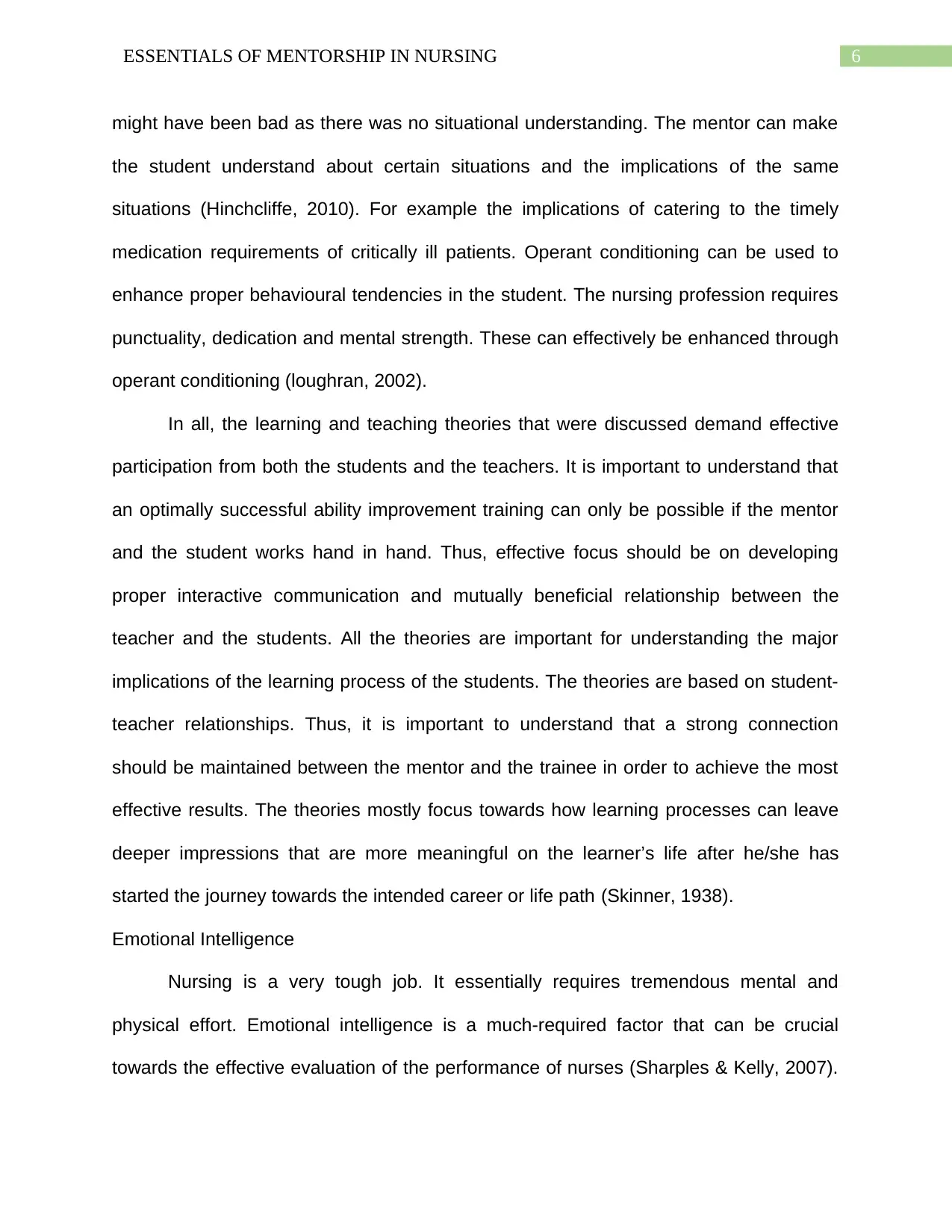
6ESSENTIALS OF MENTORSHIP IN NURSING
might have been bad as there was no situational understanding. The mentor can make
the student understand about certain situations and the implications of the same
situations (Hinchcliffe, 2010). For example the implications of catering to the timely
medication requirements of critically ill patients. Operant conditioning can be used to
enhance proper behavioural tendencies in the student. The nursing profession requires
punctuality, dedication and mental strength. These can effectively be enhanced through
operant conditioning (loughran, 2002).
In all, the learning and teaching theories that were discussed demand effective
participation from both the students and the teachers. It is important to understand that
an optimally successful ability improvement training can only be possible if the mentor
and the student works hand in hand. Thus, effective focus should be on developing
proper interactive communication and mutually beneficial relationship between the
teacher and the students. All the theories are important for understanding the major
implications of the learning process of the students. The theories are based on student-
teacher relationships. Thus, it is important to understand that a strong connection
should be maintained between the mentor and the trainee in order to achieve the most
effective results. The theories mostly focus towards how learning processes can leave
deeper impressions that are more meaningful on the learner’s life after he/she has
started the journey towards the intended career or life path (Skinner, 1938).
Emotional Intelligence
Nursing is a very tough job. It essentially requires tremendous mental and
physical effort. Emotional intelligence is a much-required factor that can be crucial
towards the effective evaluation of the performance of nurses (Sharples & Kelly, 2007).
might have been bad as there was no situational understanding. The mentor can make
the student understand about certain situations and the implications of the same
situations (Hinchcliffe, 2010). For example the implications of catering to the timely
medication requirements of critically ill patients. Operant conditioning can be used to
enhance proper behavioural tendencies in the student. The nursing profession requires
punctuality, dedication and mental strength. These can effectively be enhanced through
operant conditioning (loughran, 2002).
In all, the learning and teaching theories that were discussed demand effective
participation from both the students and the teachers. It is important to understand that
an optimally successful ability improvement training can only be possible if the mentor
and the student works hand in hand. Thus, effective focus should be on developing
proper interactive communication and mutually beneficial relationship between the
teacher and the students. All the theories are important for understanding the major
implications of the learning process of the students. The theories are based on student-
teacher relationships. Thus, it is important to understand that a strong connection
should be maintained between the mentor and the trainee in order to achieve the most
effective results. The theories mostly focus towards how learning processes can leave
deeper impressions that are more meaningful on the learner’s life after he/she has
started the journey towards the intended career or life path (Skinner, 1938).
Emotional Intelligence
Nursing is a very tough job. It essentially requires tremendous mental and
physical effort. Emotional intelligence is a much-required factor that can be crucial
towards the effective evaluation of the performance of nurses (Sharples & Kelly, 2007).
Paraphrase This Document
Need a fresh take? Get an instant paraphrase of this document with our AI Paraphraser
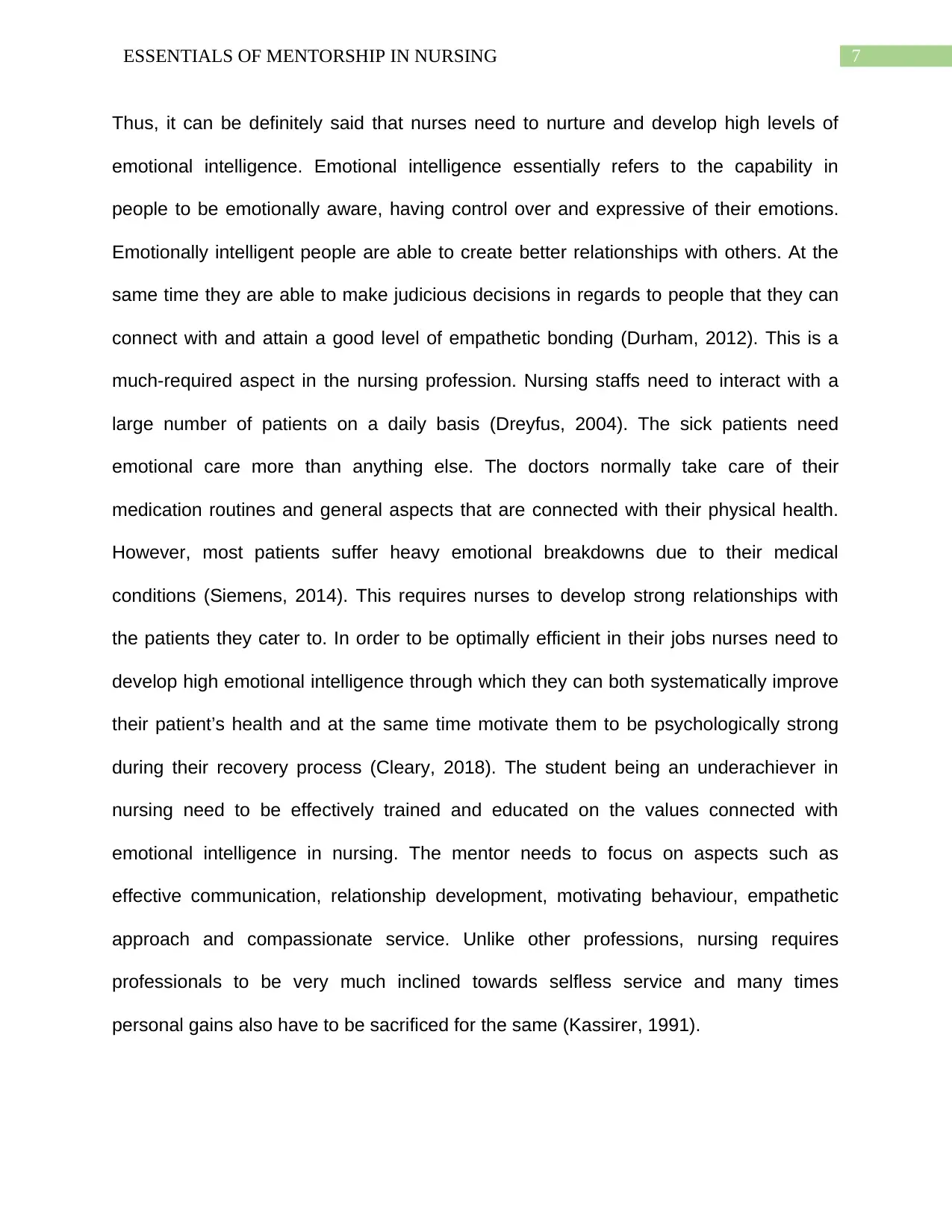
7ESSENTIALS OF MENTORSHIP IN NURSING
Thus, it can be definitely said that nurses need to nurture and develop high levels of
emotional intelligence. Emotional intelligence essentially refers to the capability in
people to be emotionally aware, having control over and expressive of their emotions.
Emotionally intelligent people are able to create better relationships with others. At the
same time they are able to make judicious decisions in regards to people that they can
connect with and attain a good level of empathetic bonding (Durham, 2012). This is a
much-required aspect in the nursing profession. Nursing staffs need to interact with a
large number of patients on a daily basis (Dreyfus, 2004). The sick patients need
emotional care more than anything else. The doctors normally take care of their
medication routines and general aspects that are connected with their physical health.
However, most patients suffer heavy emotional breakdowns due to their medical
conditions (Siemens, 2014). This requires nurses to develop strong relationships with
the patients they cater to. In order to be optimally efficient in their jobs nurses need to
develop high emotional intelligence through which they can both systematically improve
their patient’s health and at the same time motivate them to be psychologically strong
during their recovery process (Cleary, 2018). The student being an underachiever in
nursing need to be effectively trained and educated on the values connected with
emotional intelligence in nursing. The mentor needs to focus on aspects such as
effective communication, relationship development, motivating behaviour, empathetic
approach and compassionate service. Unlike other professions, nursing requires
professionals to be very much inclined towards selfless service and many times
personal gains also have to be sacrificed for the same (Kassirer, 1991).
Thus, it can be definitely said that nurses need to nurture and develop high levels of
emotional intelligence. Emotional intelligence essentially refers to the capability in
people to be emotionally aware, having control over and expressive of their emotions.
Emotionally intelligent people are able to create better relationships with others. At the
same time they are able to make judicious decisions in regards to people that they can
connect with and attain a good level of empathetic bonding (Durham, 2012). This is a
much-required aspect in the nursing profession. Nursing staffs need to interact with a
large number of patients on a daily basis (Dreyfus, 2004). The sick patients need
emotional care more than anything else. The doctors normally take care of their
medication routines and general aspects that are connected with their physical health.
However, most patients suffer heavy emotional breakdowns due to their medical
conditions (Siemens, 2014). This requires nurses to develop strong relationships with
the patients they cater to. In order to be optimally efficient in their jobs nurses need to
develop high emotional intelligence through which they can both systematically improve
their patient’s health and at the same time motivate them to be psychologically strong
during their recovery process (Cleary, 2018). The student being an underachiever in
nursing need to be effectively trained and educated on the values connected with
emotional intelligence in nursing. The mentor needs to focus on aspects such as
effective communication, relationship development, motivating behaviour, empathetic
approach and compassionate service. Unlike other professions, nursing requires
professionals to be very much inclined towards selfless service and many times
personal gains also have to be sacrificed for the same (Kassirer, 1991).
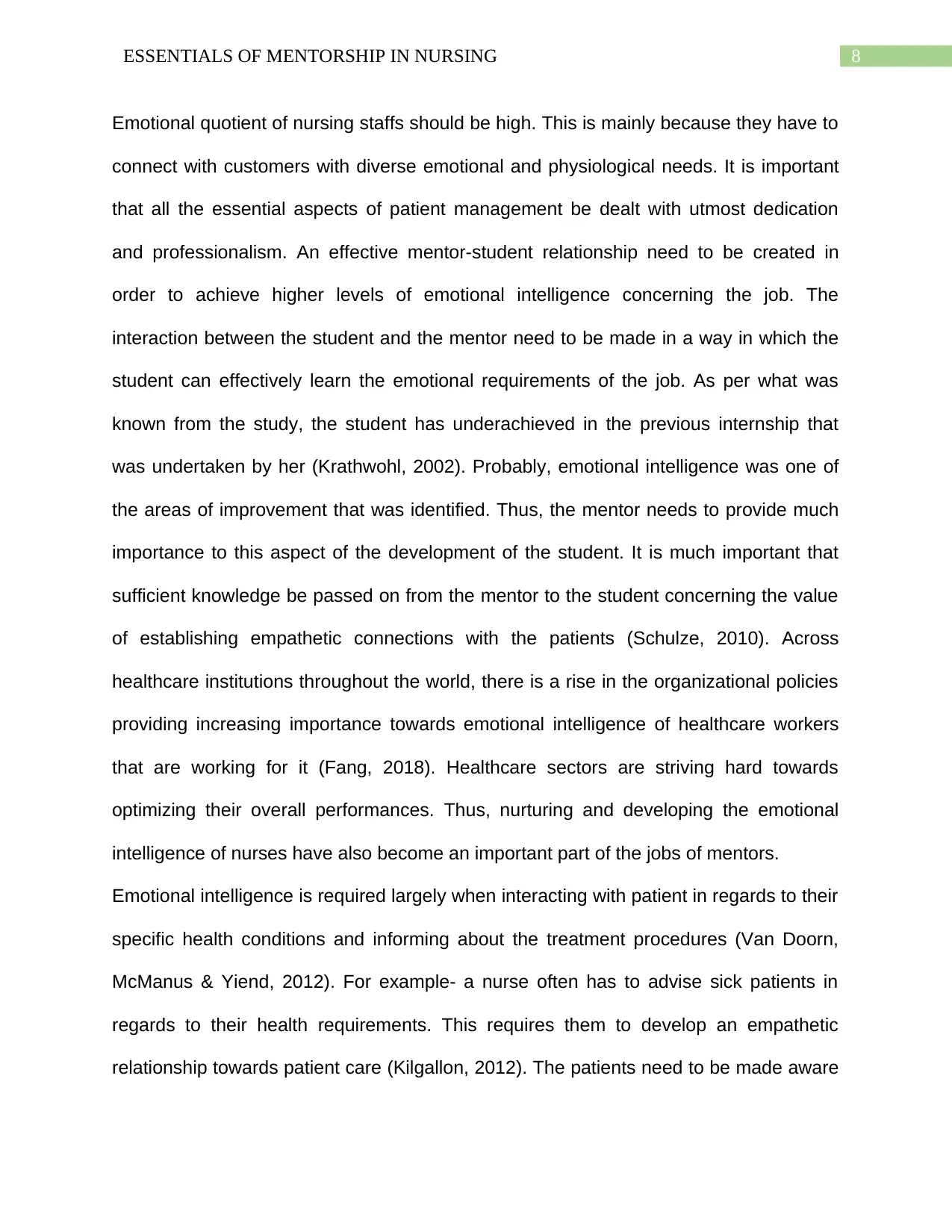
8ESSENTIALS OF MENTORSHIP IN NURSING
Emotional quotient of nursing staffs should be high. This is mainly because they have to
connect with customers with diverse emotional and physiological needs. It is important
that all the essential aspects of patient management be dealt with utmost dedication
and professionalism. An effective mentor-student relationship need to be created in
order to achieve higher levels of emotional intelligence concerning the job. The
interaction between the student and the mentor need to be made in a way in which the
student can effectively learn the emotional requirements of the job. As per what was
known from the study, the student has underachieved in the previous internship that
was undertaken by her (Krathwohl, 2002). Probably, emotional intelligence was one of
the areas of improvement that was identified. Thus, the mentor needs to provide much
importance to this aspect of the development of the student. It is much important that
sufficient knowledge be passed on from the mentor to the student concerning the value
of establishing empathetic connections with the patients (Schulze, 2010). Across
healthcare institutions throughout the world, there is a rise in the organizational policies
providing increasing importance towards emotional intelligence of healthcare workers
that are working for it (Fang, 2018). Healthcare sectors are striving hard towards
optimizing their overall performances. Thus, nurturing and developing the emotional
intelligence of nurses have also become an important part of the jobs of mentors.
Emotional intelligence is required largely when interacting with patient in regards to their
specific health conditions and informing about the treatment procedures (Van Doorn,
McManus & Yiend, 2012). For example- a nurse often has to advise sick patients in
regards to their health requirements. This requires them to develop an empathetic
relationship towards patient care (Kilgallon, 2012). The patients need to be made aware
Emotional quotient of nursing staffs should be high. This is mainly because they have to
connect with customers with diverse emotional and physiological needs. It is important
that all the essential aspects of patient management be dealt with utmost dedication
and professionalism. An effective mentor-student relationship need to be created in
order to achieve higher levels of emotional intelligence concerning the job. The
interaction between the student and the mentor need to be made in a way in which the
student can effectively learn the emotional requirements of the job. As per what was
known from the study, the student has underachieved in the previous internship that
was undertaken by her (Krathwohl, 2002). Probably, emotional intelligence was one of
the areas of improvement that was identified. Thus, the mentor needs to provide much
importance to this aspect of the development of the student. It is much important that
sufficient knowledge be passed on from the mentor to the student concerning the value
of establishing empathetic connections with the patients (Schulze, 2010). Across
healthcare institutions throughout the world, there is a rise in the organizational policies
providing increasing importance towards emotional intelligence of healthcare workers
that are working for it (Fang, 2018). Healthcare sectors are striving hard towards
optimizing their overall performances. Thus, nurturing and developing the emotional
intelligence of nurses have also become an important part of the jobs of mentors.
Emotional intelligence is required largely when interacting with patient in regards to their
specific health conditions and informing about the treatment procedures (Van Doorn,
McManus & Yiend, 2012). For example- a nurse often has to advise sick patients in
regards to their health requirements. This requires them to develop an empathetic
relationship towards patient care (Kilgallon, 2012). The patients need to be made aware
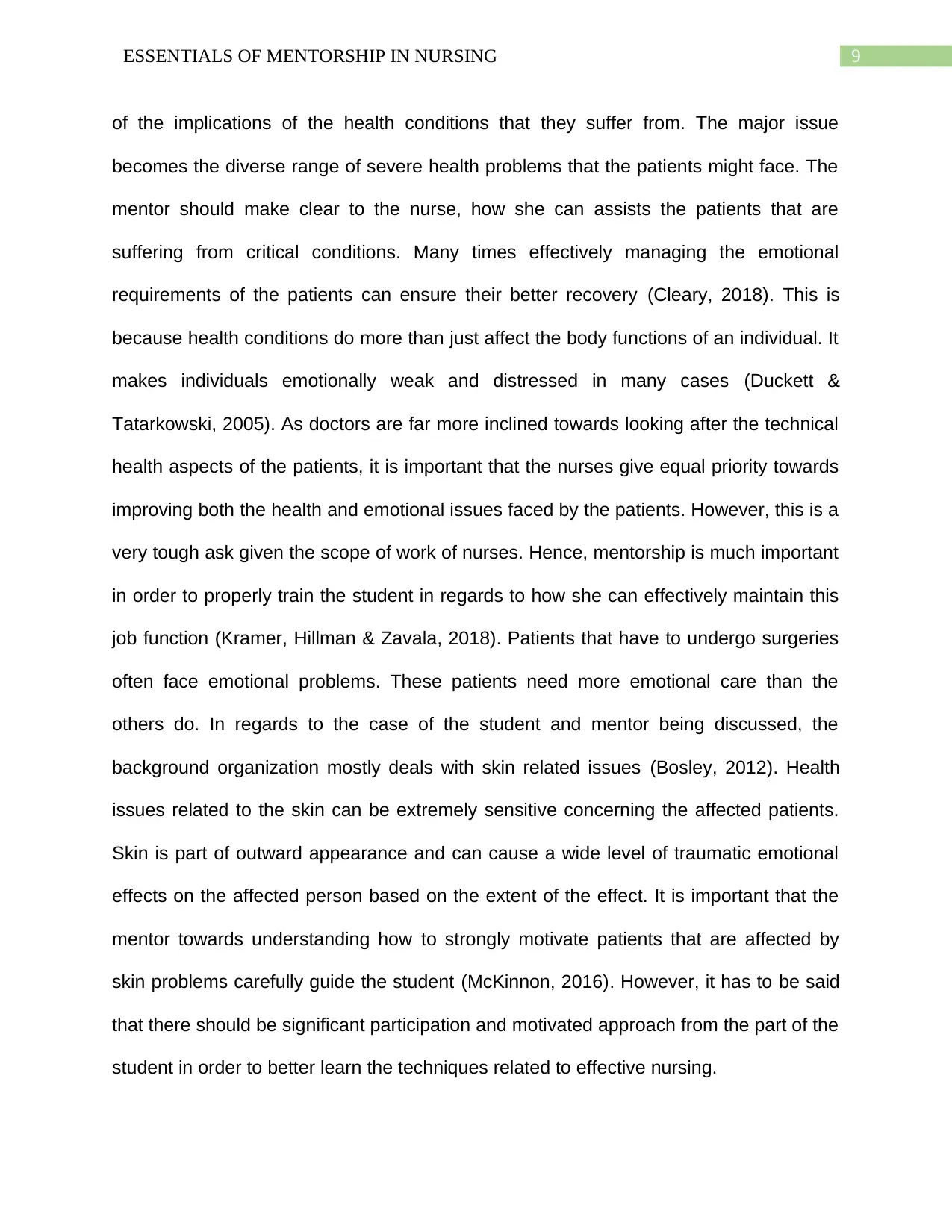
9ESSENTIALS OF MENTORSHIP IN NURSING
of the implications of the health conditions that they suffer from. The major issue
becomes the diverse range of severe health problems that the patients might face. The
mentor should make clear to the nurse, how she can assists the patients that are
suffering from critical conditions. Many times effectively managing the emotional
requirements of the patients can ensure their better recovery (Cleary, 2018). This is
because health conditions do more than just affect the body functions of an individual. It
makes individuals emotionally weak and distressed in many cases (Duckett &
Tatarkowski, 2005). As doctors are far more inclined towards looking after the technical
health aspects of the patients, it is important that the nurses give equal priority towards
improving both the health and emotional issues faced by the patients. However, this is a
very tough ask given the scope of work of nurses. Hence, mentorship is much important
in order to properly train the student in regards to how she can effectively maintain this
job function (Kramer, Hillman & Zavala, 2018). Patients that have to undergo surgeries
often face emotional problems. These patients need more emotional care than the
others do. In regards to the case of the student and mentor being discussed, the
background organization mostly deals with skin related issues (Bosley, 2012). Health
issues related to the skin can be extremely sensitive concerning the affected patients.
Skin is part of outward appearance and can cause a wide level of traumatic emotional
effects on the affected person based on the extent of the effect. It is important that the
mentor towards understanding how to strongly motivate patients that are affected by
skin problems carefully guide the student (McKinnon, 2016). However, it has to be said
that there should be significant participation and motivated approach from the part of the
student in order to better learn the techniques related to effective nursing.
of the implications of the health conditions that they suffer from. The major issue
becomes the diverse range of severe health problems that the patients might face. The
mentor should make clear to the nurse, how she can assists the patients that are
suffering from critical conditions. Many times effectively managing the emotional
requirements of the patients can ensure their better recovery (Cleary, 2018). This is
because health conditions do more than just affect the body functions of an individual. It
makes individuals emotionally weak and distressed in many cases (Duckett &
Tatarkowski, 2005). As doctors are far more inclined towards looking after the technical
health aspects of the patients, it is important that the nurses give equal priority towards
improving both the health and emotional issues faced by the patients. However, this is a
very tough ask given the scope of work of nurses. Hence, mentorship is much important
in order to properly train the student in regards to how she can effectively maintain this
job function (Kramer, Hillman & Zavala, 2018). Patients that have to undergo surgeries
often face emotional problems. These patients need more emotional care than the
others do. In regards to the case of the student and mentor being discussed, the
background organization mostly deals with skin related issues (Bosley, 2012). Health
issues related to the skin can be extremely sensitive concerning the affected patients.
Skin is part of outward appearance and can cause a wide level of traumatic emotional
effects on the affected person based on the extent of the effect. It is important that the
mentor towards understanding how to strongly motivate patients that are affected by
skin problems carefully guide the student (McKinnon, 2016). However, it has to be said
that there should be significant participation and motivated approach from the part of the
student in order to better learn the techniques related to effective nursing.
Secure Best Marks with AI Grader
Need help grading? Try our AI Grader for instant feedback on your assignments.
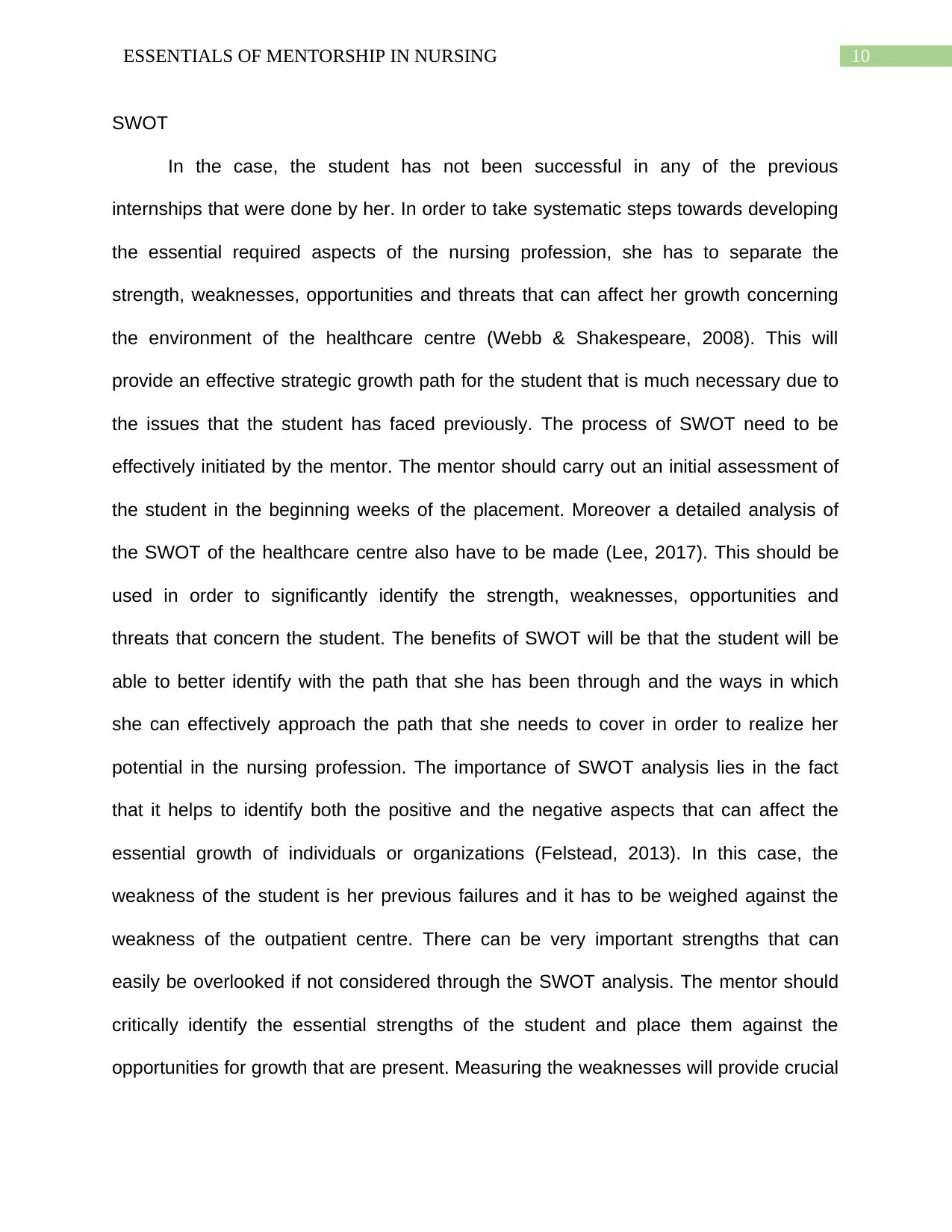
10ESSENTIALS OF MENTORSHIP IN NURSING
SWOT
In the case, the student has not been successful in any of the previous
internships that were done by her. In order to take systematic steps towards developing
the essential required aspects of the nursing profession, she has to separate the
strength, weaknesses, opportunities and threats that can affect her growth concerning
the environment of the healthcare centre (Webb & Shakespeare, 2008). This will
provide an effective strategic growth path for the student that is much necessary due to
the issues that the student has faced previously. The process of SWOT need to be
effectively initiated by the mentor. The mentor should carry out an initial assessment of
the student in the beginning weeks of the placement. Moreover a detailed analysis of
the SWOT of the healthcare centre also have to be made (Lee, 2017). This should be
used in order to significantly identify the strength, weaknesses, opportunities and
threats that concern the student. The benefits of SWOT will be that the student will be
able to better identify with the path that she has been through and the ways in which
she can effectively approach the path that she needs to cover in order to realize her
potential in the nursing profession. The importance of SWOT analysis lies in the fact
that it helps to identify both the positive and the negative aspects that can affect the
essential growth of individuals or organizations (Felstead, 2013). In this case, the
weakness of the student is her previous failures and it has to be weighed against the
weakness of the outpatient centre. There can be very important strengths that can
easily be overlooked if not considered through the SWOT analysis. The mentor should
critically identify the essential strengths of the student and place them against the
opportunities for growth that are present. Measuring the weaknesses will provide crucial
SWOT
In the case, the student has not been successful in any of the previous
internships that were done by her. In order to take systematic steps towards developing
the essential required aspects of the nursing profession, she has to separate the
strength, weaknesses, opportunities and threats that can affect her growth concerning
the environment of the healthcare centre (Webb & Shakespeare, 2008). This will
provide an effective strategic growth path for the student that is much necessary due to
the issues that the student has faced previously. The process of SWOT need to be
effectively initiated by the mentor. The mentor should carry out an initial assessment of
the student in the beginning weeks of the placement. Moreover a detailed analysis of
the SWOT of the healthcare centre also have to be made (Lee, 2017). This should be
used in order to significantly identify the strength, weaknesses, opportunities and
threats that concern the student. The benefits of SWOT will be that the student will be
able to better identify with the path that she has been through and the ways in which
she can effectively approach the path that she needs to cover in order to realize her
potential in the nursing profession. The importance of SWOT analysis lies in the fact
that it helps to identify both the positive and the negative aspects that can affect the
essential growth of individuals or organizations (Felstead, 2013). In this case, the
weakness of the student is her previous failures and it has to be weighed against the
weakness of the outpatient centre. There can be very important strengths that can
easily be overlooked if not considered through the SWOT analysis. The mentor should
critically identify the essential strengths of the student and place them against the
opportunities for growth that are present. Measuring the weaknesses will provide crucial
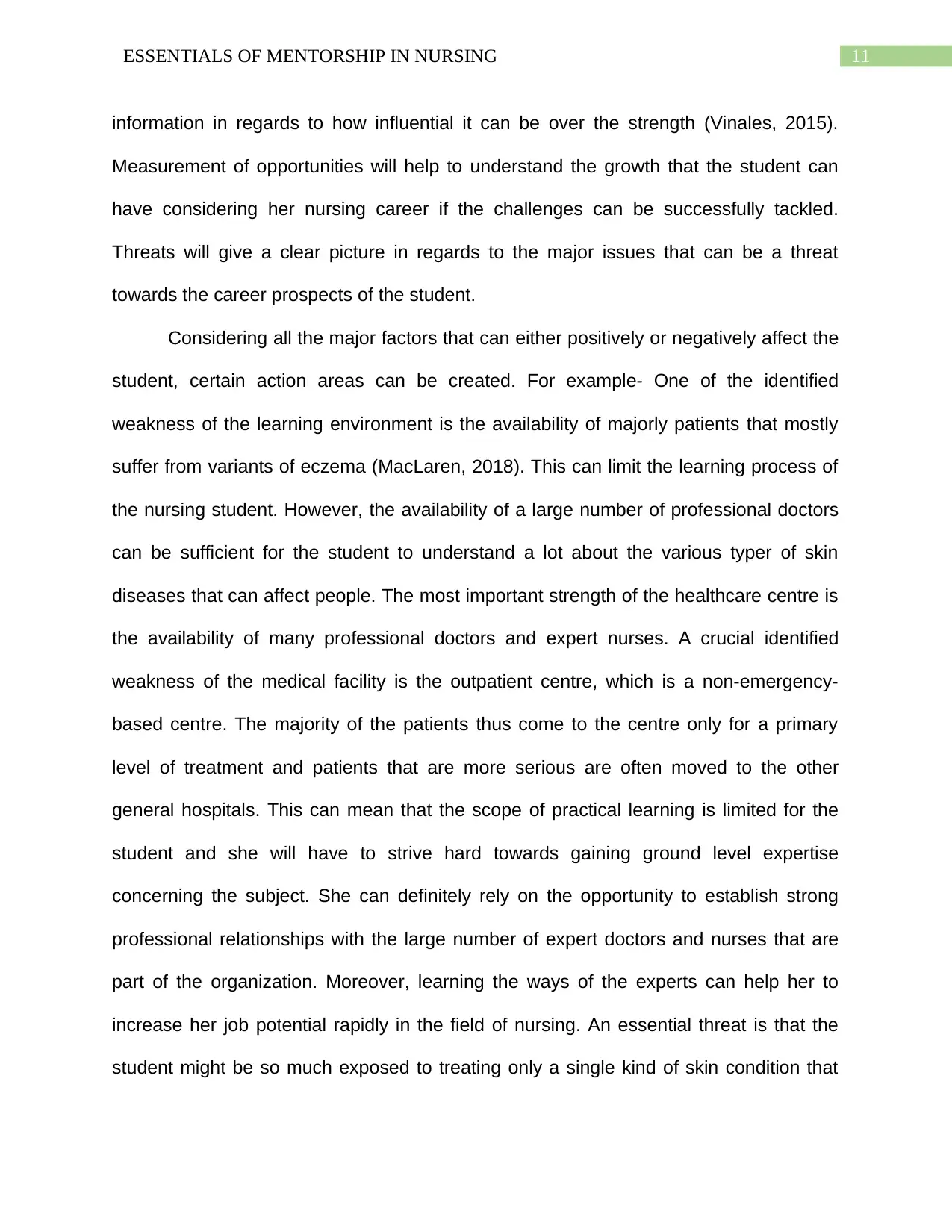
11ESSENTIALS OF MENTORSHIP IN NURSING
information in regards to how influential it can be over the strength (Vinales, 2015).
Measurement of opportunities will help to understand the growth that the student can
have considering her nursing career if the challenges can be successfully tackled.
Threats will give a clear picture in regards to the major issues that can be a threat
towards the career prospects of the student.
Considering all the major factors that can either positively or negatively affect the
student, certain action areas can be created. For example- One of the identified
weakness of the learning environment is the availability of majorly patients that mostly
suffer from variants of eczema (MacLaren, 2018). This can limit the learning process of
the nursing student. However, the availability of a large number of professional doctors
can be sufficient for the student to understand a lot about the various typer of skin
diseases that can affect people. The most important strength of the healthcare centre is
the availability of many professional doctors and expert nurses. A crucial identified
weakness of the medical facility is the outpatient centre, which is a non-emergency-
based centre. The majority of the patients thus come to the centre only for a primary
level of treatment and patients that are more serious are often moved to the other
general hospitals. This can mean that the scope of practical learning is limited for the
student and she will have to strive hard towards gaining ground level expertise
concerning the subject. She can definitely rely on the opportunity to establish strong
professional relationships with the large number of expert doctors and nurses that are
part of the organization. Moreover, learning the ways of the experts can help her to
increase her job potential rapidly in the field of nursing. An essential threat is that the
student might be so much exposed to treating only a single kind of skin condition that
information in regards to how influential it can be over the strength (Vinales, 2015).
Measurement of opportunities will help to understand the growth that the student can
have considering her nursing career if the challenges can be successfully tackled.
Threats will give a clear picture in regards to the major issues that can be a threat
towards the career prospects of the student.
Considering all the major factors that can either positively or negatively affect the
student, certain action areas can be created. For example- One of the identified
weakness of the learning environment is the availability of majorly patients that mostly
suffer from variants of eczema (MacLaren, 2018). This can limit the learning process of
the nursing student. However, the availability of a large number of professional doctors
can be sufficient for the student to understand a lot about the various typer of skin
diseases that can affect people. The most important strength of the healthcare centre is
the availability of many professional doctors and expert nurses. A crucial identified
weakness of the medical facility is the outpatient centre, which is a non-emergency-
based centre. The majority of the patients thus come to the centre only for a primary
level of treatment and patients that are more serious are often moved to the other
general hospitals. This can mean that the scope of practical learning is limited for the
student and she will have to strive hard towards gaining ground level expertise
concerning the subject. She can definitely rely on the opportunity to establish strong
professional relationships with the large number of expert doctors and nurses that are
part of the organization. Moreover, learning the ways of the experts can help her to
increase her job potential rapidly in the field of nursing. An essential threat is that the
student might be so much exposed to treating only a single kind of skin condition that
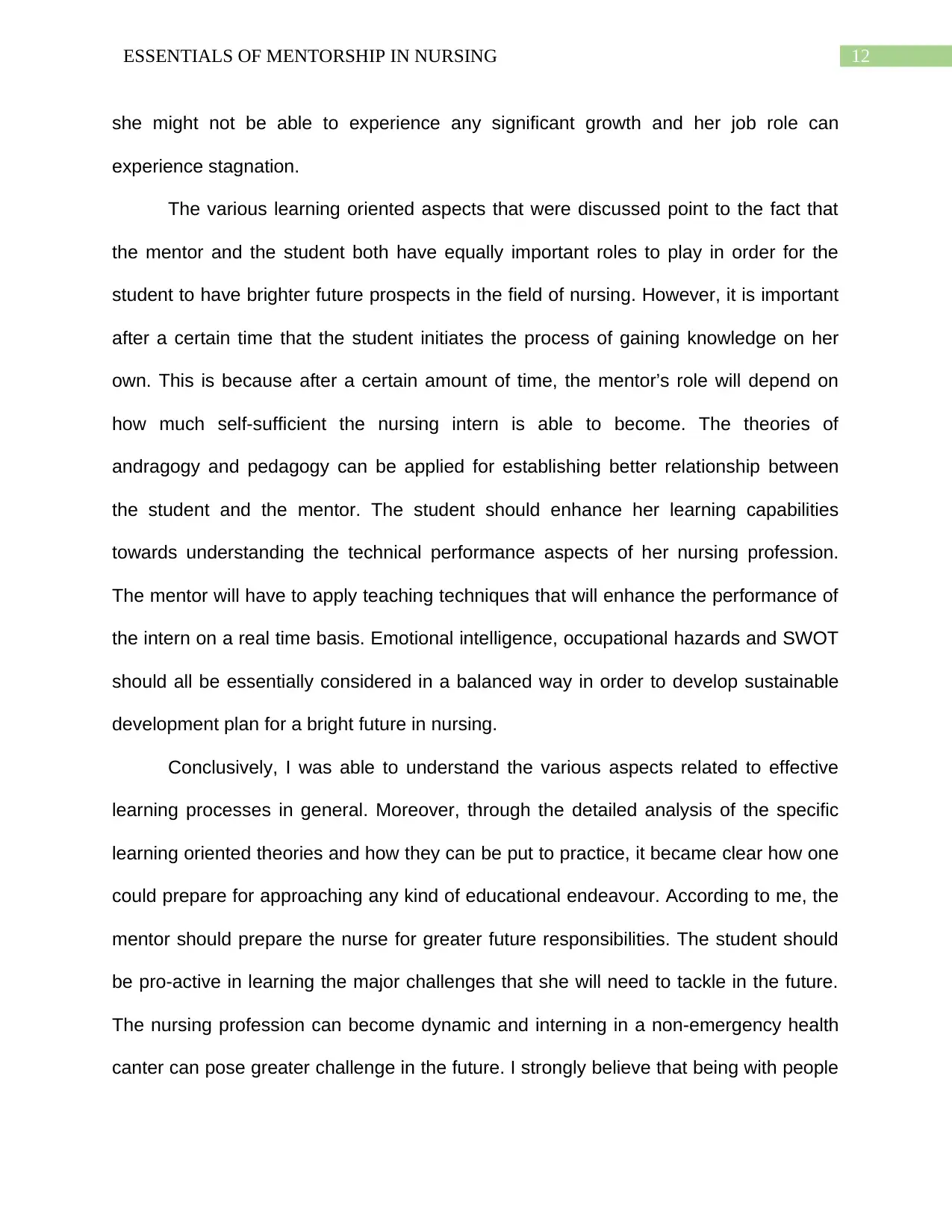
12ESSENTIALS OF MENTORSHIP IN NURSING
she might not be able to experience any significant growth and her job role can
experience stagnation.
The various learning oriented aspects that were discussed point to the fact that
the mentor and the student both have equally important roles to play in order for the
student to have brighter future prospects in the field of nursing. However, it is important
after a certain time that the student initiates the process of gaining knowledge on her
own. This is because after a certain amount of time, the mentor’s role will depend on
how much self-sufficient the nursing intern is able to become. The theories of
andragogy and pedagogy can be applied for establishing better relationship between
the student and the mentor. The student should enhance her learning capabilities
towards understanding the technical performance aspects of her nursing profession.
The mentor will have to apply teaching techniques that will enhance the performance of
the intern on a real time basis. Emotional intelligence, occupational hazards and SWOT
should all be essentially considered in a balanced way in order to develop sustainable
development plan for a bright future in nursing.
Conclusively, I was able to understand the various aspects related to effective
learning processes in general. Moreover, through the detailed analysis of the specific
learning oriented theories and how they can be put to practice, it became clear how one
could prepare for approaching any kind of educational endeavour. According to me, the
mentor should prepare the nurse for greater future responsibilities. The student should
be pro-active in learning the major challenges that she will need to tackle in the future.
The nursing profession can become dynamic and interning in a non-emergency health
canter can pose greater challenge in the future. I strongly believe that being with people
she might not be able to experience any significant growth and her job role can
experience stagnation.
The various learning oriented aspects that were discussed point to the fact that
the mentor and the student both have equally important roles to play in order for the
student to have brighter future prospects in the field of nursing. However, it is important
after a certain time that the student initiates the process of gaining knowledge on her
own. This is because after a certain amount of time, the mentor’s role will depend on
how much self-sufficient the nursing intern is able to become. The theories of
andragogy and pedagogy can be applied for establishing better relationship between
the student and the mentor. The student should enhance her learning capabilities
towards understanding the technical performance aspects of her nursing profession.
The mentor will have to apply teaching techniques that will enhance the performance of
the intern on a real time basis. Emotional intelligence, occupational hazards and SWOT
should all be essentially considered in a balanced way in order to develop sustainable
development plan for a bright future in nursing.
Conclusively, I was able to understand the various aspects related to effective
learning processes in general. Moreover, through the detailed analysis of the specific
learning oriented theories and how they can be put to practice, it became clear how one
could prepare for approaching any kind of educational endeavour. According to me, the
mentor should prepare the nurse for greater future responsibilities. The student should
be pro-active in learning the major challenges that she will need to tackle in the future.
The nursing profession can become dynamic and interning in a non-emergency health
canter can pose greater challenge in the future. I strongly believe that being with people
Paraphrase This Document
Need a fresh take? Get an instant paraphrase of this document with our AI Paraphraser
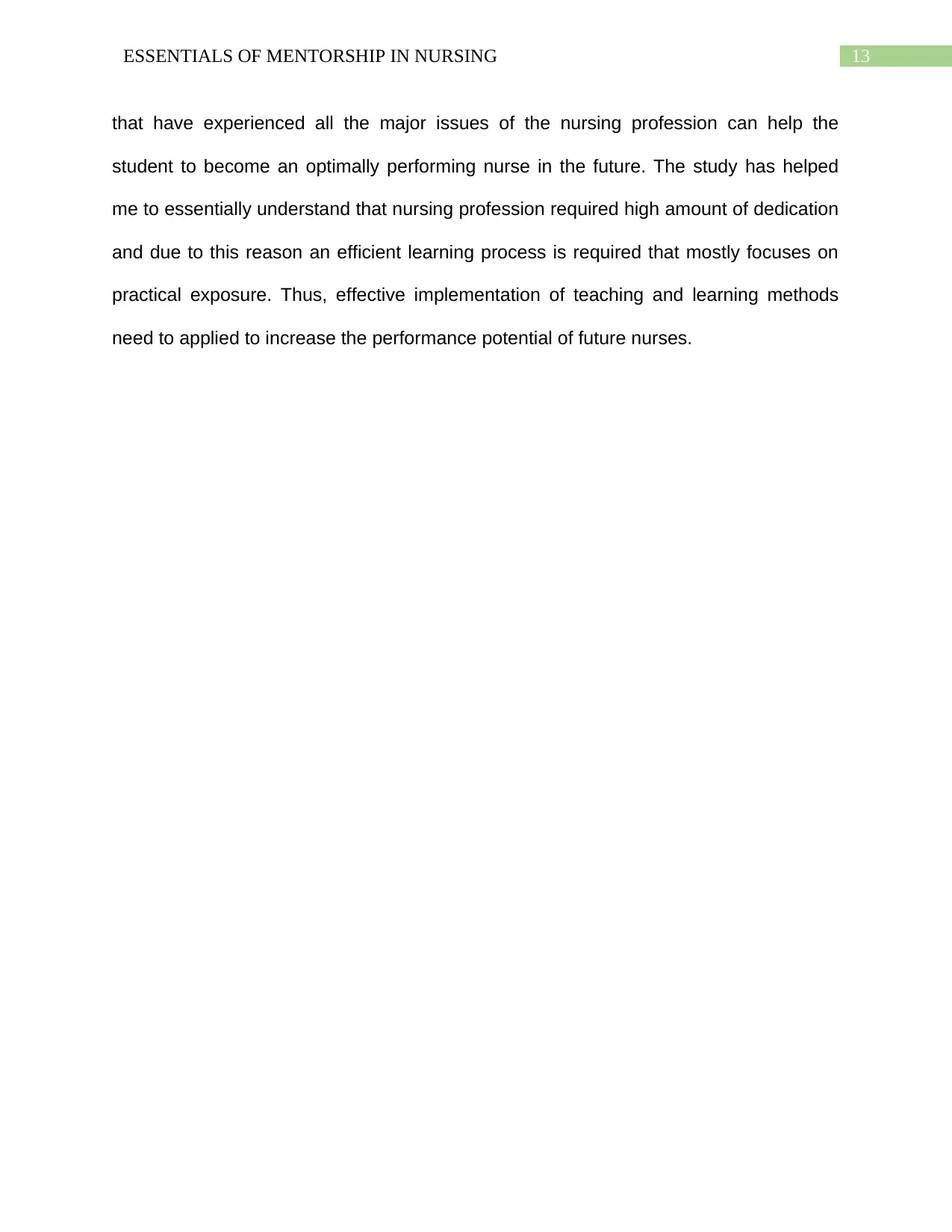
13ESSENTIALS OF MENTORSHIP IN NURSING
that have experienced all the major issues of the nursing profession can help the
student to become an optimally performing nurse in the future. The study has helped
me to essentially understand that nursing profession required high amount of dedication
and due to this reason an efficient learning process is required that mostly focuses on
practical exposure. Thus, effective implementation of teaching and learning methods
need to applied to increase the performance potential of future nurses.
that have experienced all the major issues of the nursing profession can help the
student to become an optimally performing nurse in the future. The study has helped
me to essentially understand that nursing profession required high amount of dedication
and due to this reason an efficient learning process is required that mostly focuses on
practical exposure. Thus, effective implementation of teaching and learning methods
need to applied to increase the performance potential of future nurses.
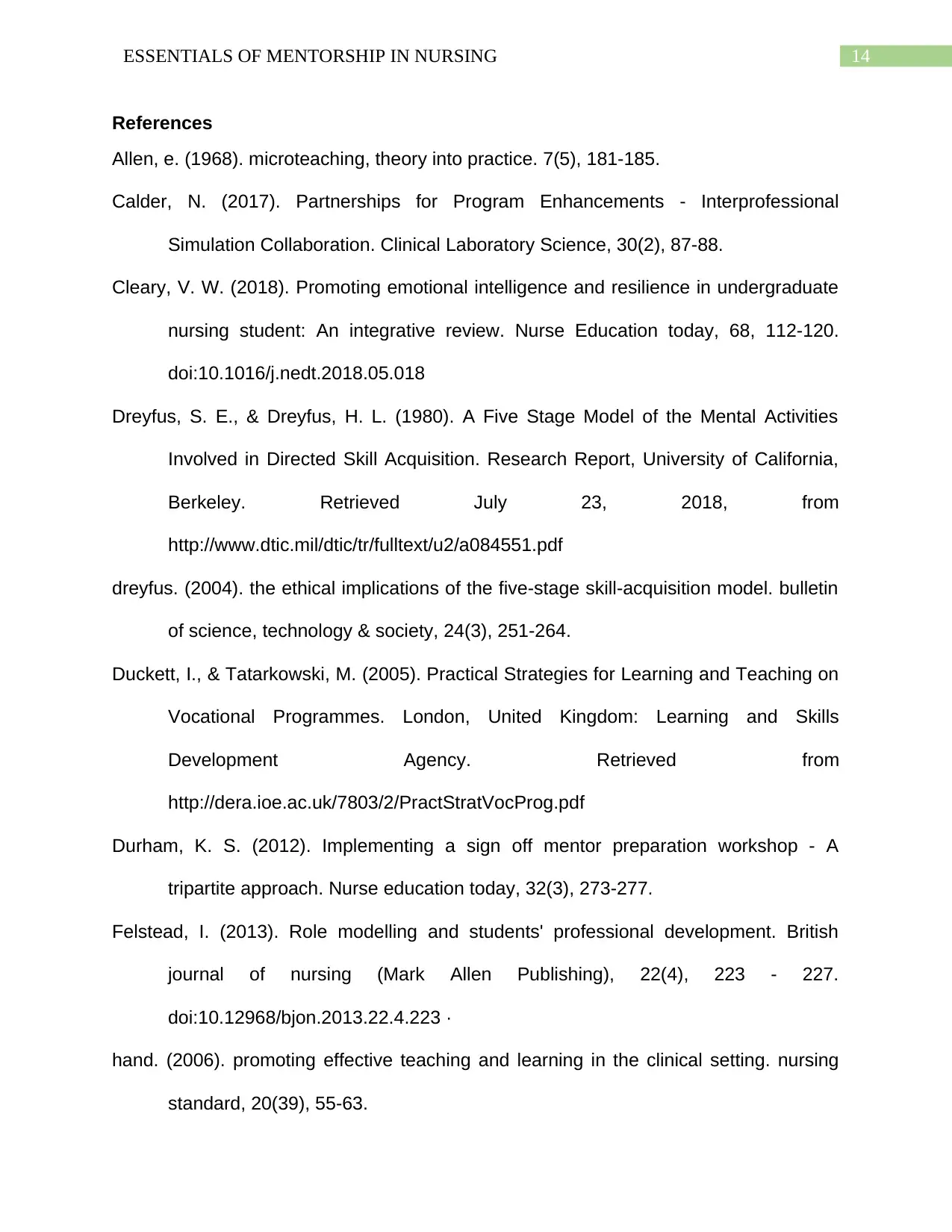
14ESSENTIALS OF MENTORSHIP IN NURSING
References
Allen, e. (1968). microteaching, theory into practice. 7(5), 181-185.
Calder, N. (2017). Partnerships for Program Enhancements - Interprofessional
Simulation Collaboration. Clinical Laboratory Science, 30(2), 87-88.
Cleary, V. W. (2018). Promoting emotional intelligence and resilience in undergraduate
nursing student: An integrative review. Nurse Education today, 68, 112-120.
doi:10.1016/j.nedt.2018.05.018
Dreyfus, S. E., & Dreyfus, H. L. (1980). A Five Stage Model of the Mental Activities
Involved in Directed Skill Acquisition. Research Report, University of California,
Berkeley. Retrieved July 23, 2018, from
http://www.dtic.mil/dtic/tr/fulltext/u2/a084551.pdf
dreyfus. (2004). the ethical implications of the five-stage skill-acquisition model. bulletin
of science, technology & society, 24(3), 251-264.
Duckett, I., & Tatarkowski, M. (2005). Practical Strategies for Learning and Teaching on
Vocational Programmes. London, United Kingdom: Learning and Skills
Development Agency. Retrieved from
http://dera.ioe.ac.uk/7803/2/PractStratVocProg.pdf
Durham, K. S. (2012). Implementing a sign off mentor preparation workshop - A
tripartite approach. Nurse education today, 32(3), 273-277.
Felstead, I. (2013). Role modelling and students' professional development. British
journal of nursing (Mark Allen Publishing), 22(4), 223 - 227.
doi:10.12968/bjon.2013.22.4.223 ·
hand. (2006). promoting effective teaching and learning in the clinical setting. nursing
standard, 20(39), 55-63.
References
Allen, e. (1968). microteaching, theory into practice. 7(5), 181-185.
Calder, N. (2017). Partnerships for Program Enhancements - Interprofessional
Simulation Collaboration. Clinical Laboratory Science, 30(2), 87-88.
Cleary, V. W. (2018). Promoting emotional intelligence and resilience in undergraduate
nursing student: An integrative review. Nurse Education today, 68, 112-120.
doi:10.1016/j.nedt.2018.05.018
Dreyfus, S. E., & Dreyfus, H. L. (1980). A Five Stage Model of the Mental Activities
Involved in Directed Skill Acquisition. Research Report, University of California,
Berkeley. Retrieved July 23, 2018, from
http://www.dtic.mil/dtic/tr/fulltext/u2/a084551.pdf
dreyfus. (2004). the ethical implications of the five-stage skill-acquisition model. bulletin
of science, technology & society, 24(3), 251-264.
Duckett, I., & Tatarkowski, M. (2005). Practical Strategies for Learning and Teaching on
Vocational Programmes. London, United Kingdom: Learning and Skills
Development Agency. Retrieved from
http://dera.ioe.ac.uk/7803/2/PractStratVocProg.pdf
Durham, K. S. (2012). Implementing a sign off mentor preparation workshop - A
tripartite approach. Nurse education today, 32(3), 273-277.
Felstead, I. (2013). Role modelling and students' professional development. British
journal of nursing (Mark Allen Publishing), 22(4), 223 - 227.
doi:10.12968/bjon.2013.22.4.223 ·
hand. (2006). promoting effective teaching and learning in the clinical setting. nursing
standard, 20(39), 55-63.
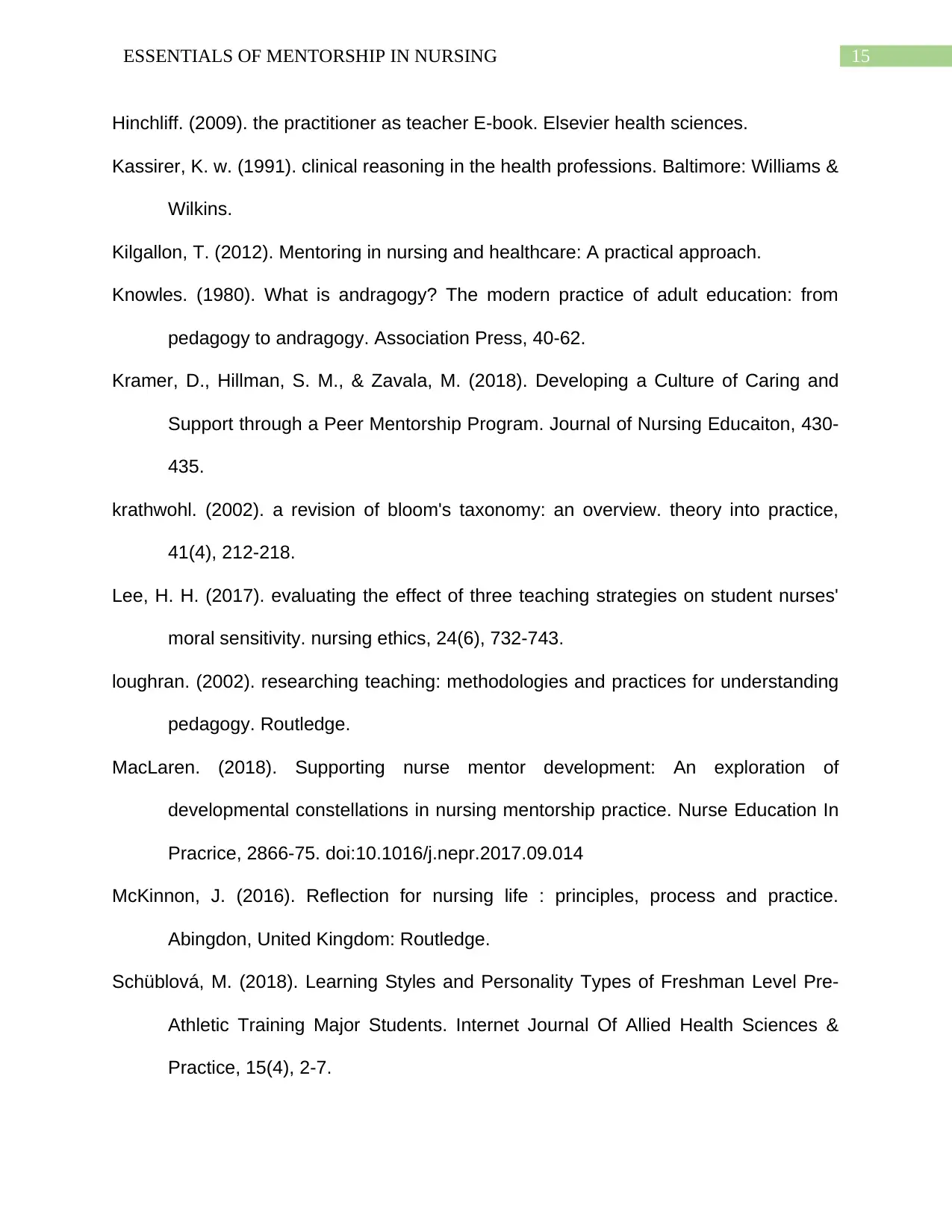
15ESSENTIALS OF MENTORSHIP IN NURSING
Hinchliff. (2009). the practitioner as teacher E-book. Elsevier health sciences.
Kassirer, K. w. (1991). clinical reasoning in the health professions. Baltimore: Williams &
Wilkins.
Kilgallon, T. (2012). Mentoring in nursing and healthcare: A practical approach.
Knowles. (1980). What is andragogy? The modern practice of adult education: from
pedagogy to andragogy. Association Press, 40-62.
Kramer, D., Hillman, S. M., & Zavala, M. (2018). Developing a Culture of Caring and
Support through a Peer Mentorship Program. Journal of Nursing Educaiton, 430-
435.
krathwohl. (2002). a revision of bloom's taxonomy: an overview. theory into practice,
41(4), 212-218.
Lee, H. H. (2017). evaluating the effect of three teaching strategies on student nurses'
moral sensitivity. nursing ethics, 24(6), 732-743.
loughran. (2002). researching teaching: methodologies and practices for understanding
pedagogy. Routledge.
MacLaren. (2018). Supporting nurse mentor development: An exploration of
developmental constellations in nursing mentorship practice. Nurse Education In
Pracrice, 2866-75. doi:10.1016/j.nepr.2017.09.014
McKinnon, J. (2016). Reflection for nursing life : principles, process and practice.
Abingdon, United Kingdom: Routledge.
Schüblová, M. (2018). Learning Styles and Personality Types of Freshman Level Pre-
Athletic Training Major Students. Internet Journal Of Allied Health Sciences &
Practice, 15(4), 2-7.
Hinchliff. (2009). the practitioner as teacher E-book. Elsevier health sciences.
Kassirer, K. w. (1991). clinical reasoning in the health professions. Baltimore: Williams &
Wilkins.
Kilgallon, T. (2012). Mentoring in nursing and healthcare: A practical approach.
Knowles. (1980). What is andragogy? The modern practice of adult education: from
pedagogy to andragogy. Association Press, 40-62.
Kramer, D., Hillman, S. M., & Zavala, M. (2018). Developing a Culture of Caring and
Support through a Peer Mentorship Program. Journal of Nursing Educaiton, 430-
435.
krathwohl. (2002). a revision of bloom's taxonomy: an overview. theory into practice,
41(4), 212-218.
Lee, H. H. (2017). evaluating the effect of three teaching strategies on student nurses'
moral sensitivity. nursing ethics, 24(6), 732-743.
loughran. (2002). researching teaching: methodologies and practices for understanding
pedagogy. Routledge.
MacLaren. (2018). Supporting nurse mentor development: An exploration of
developmental constellations in nursing mentorship practice. Nurse Education In
Pracrice, 2866-75. doi:10.1016/j.nepr.2017.09.014
McKinnon, J. (2016). Reflection for nursing life : principles, process and practice.
Abingdon, United Kingdom: Routledge.
Schüblová, M. (2018). Learning Styles and Personality Types of Freshman Level Pre-
Athletic Training Major Students. Internet Journal Of Allied Health Sciences &
Practice, 15(4), 2-7.
Secure Best Marks with AI Grader
Need help grading? Try our AI Grader for instant feedback on your assignments.
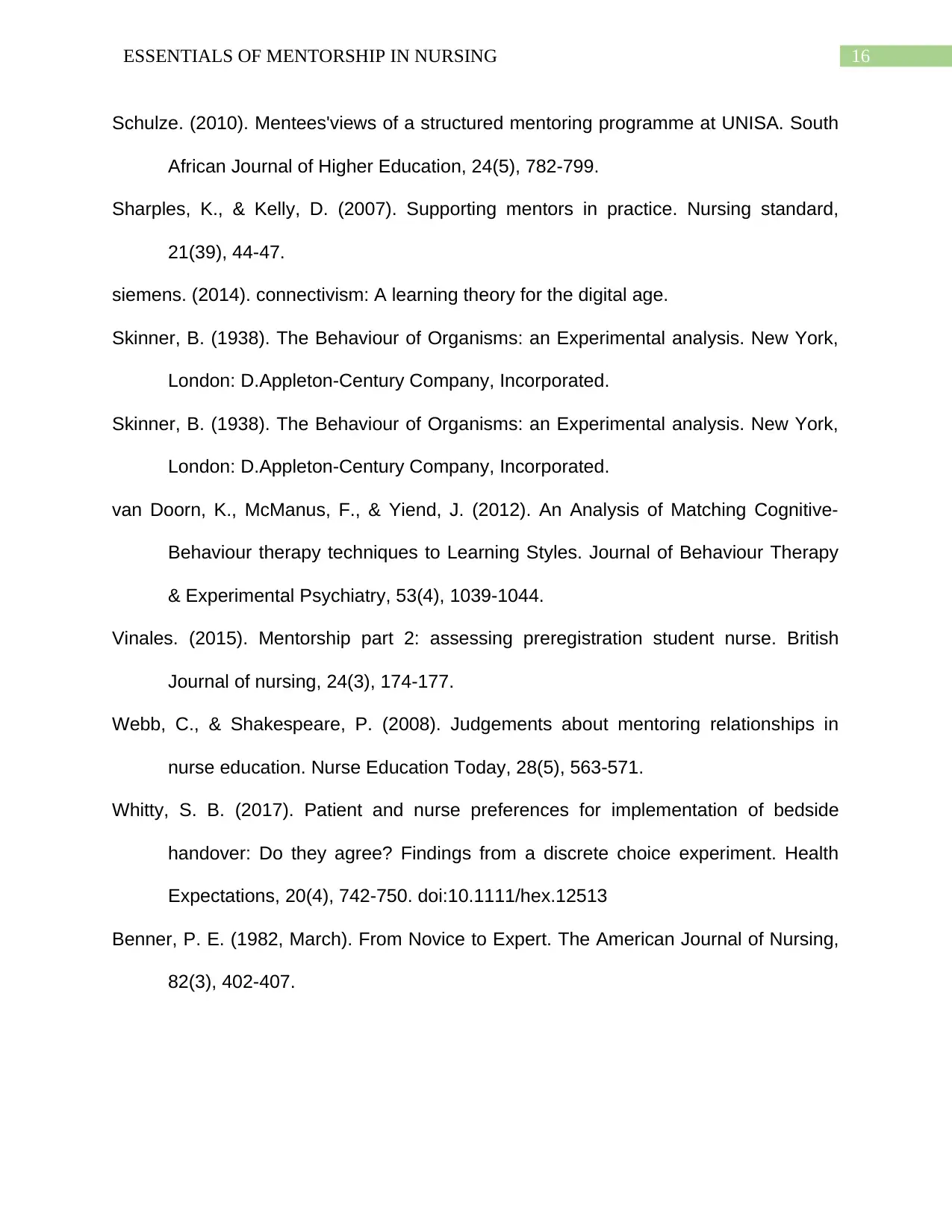
16ESSENTIALS OF MENTORSHIP IN NURSING
Schulze. (2010). Mentees'views of a structured mentoring programme at UNISA. South
African Journal of Higher Education, 24(5), 782-799.
Sharples, K., & Kelly, D. (2007). Supporting mentors in practice. Nursing standard,
21(39), 44-47.
siemens. (2014). connectivism: A learning theory for the digital age.
Skinner, B. (1938). The Behaviour of Organisms: an Experimental analysis. New York,
London: D.Appleton-Century Company, Incorporated.
Skinner, B. (1938). The Behaviour of Organisms: an Experimental analysis. New York,
London: D.Appleton-Century Company, Incorporated.
van Doorn, K., McManus, F., & Yiend, J. (2012). An Analysis of Matching Cognitive-
Behaviour therapy techniques to Learning Styles. Journal of Behaviour Therapy
& Experimental Psychiatry, 53(4), 1039-1044.
Vinales. (2015). Mentorship part 2: assessing preregistration student nurse. British
Journal of nursing, 24(3), 174-177.
Webb, C., & Shakespeare, P. (2008). Judgements about mentoring relationships in
nurse education. Nurse Education Today, 28(5), 563-571.
Whitty, S. B. (2017). Patient and nurse preferences for implementation of bedside
handover: Do they agree? Findings from a discrete choice experiment. Health
Expectations, 20(4), 742-750. doi:10.1111/hex.12513
Benner, P. E. (1982, March). From Novice to Expert. The American Journal of Nursing,
82(3), 402-407.
Schulze. (2010). Mentees'views of a structured mentoring programme at UNISA. South
African Journal of Higher Education, 24(5), 782-799.
Sharples, K., & Kelly, D. (2007). Supporting mentors in practice. Nursing standard,
21(39), 44-47.
siemens. (2014). connectivism: A learning theory for the digital age.
Skinner, B. (1938). The Behaviour of Organisms: an Experimental analysis. New York,
London: D.Appleton-Century Company, Incorporated.
Skinner, B. (1938). The Behaviour of Organisms: an Experimental analysis. New York,
London: D.Appleton-Century Company, Incorporated.
van Doorn, K., McManus, F., & Yiend, J. (2012). An Analysis of Matching Cognitive-
Behaviour therapy techniques to Learning Styles. Journal of Behaviour Therapy
& Experimental Psychiatry, 53(4), 1039-1044.
Vinales. (2015). Mentorship part 2: assessing preregistration student nurse. British
Journal of nursing, 24(3), 174-177.
Webb, C., & Shakespeare, P. (2008). Judgements about mentoring relationships in
nurse education. Nurse Education Today, 28(5), 563-571.
Whitty, S. B. (2017). Patient and nurse preferences for implementation of bedside
handover: Do they agree? Findings from a discrete choice experiment. Health
Expectations, 20(4), 742-750. doi:10.1111/hex.12513
Benner, P. E. (1982, March). From Novice to Expert. The American Journal of Nursing,
82(3), 402-407.
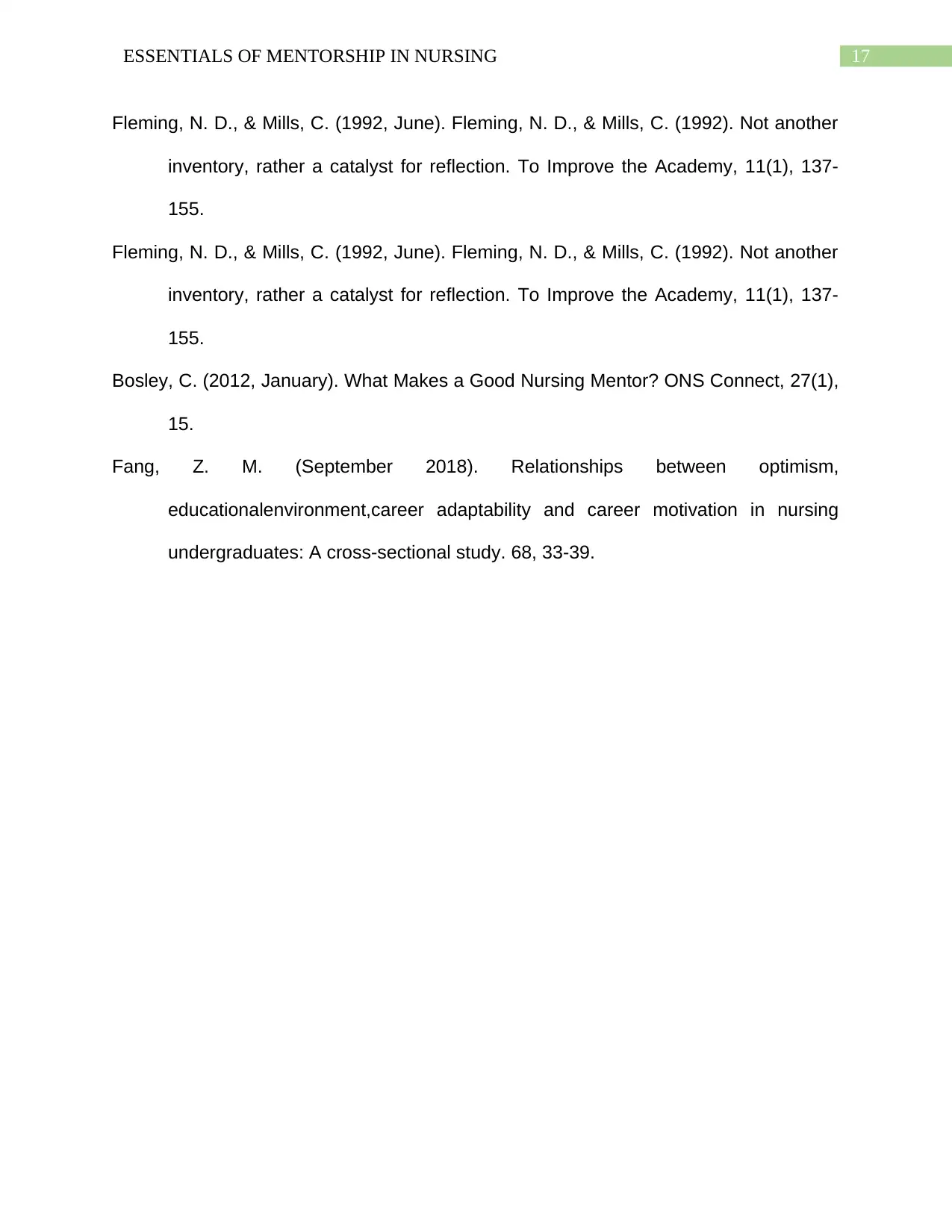
17ESSENTIALS OF MENTORSHIP IN NURSING
Fleming, N. D., & Mills, C. (1992, June). Fleming, N. D., & Mills, C. (1992). Not another
inventory, rather a catalyst for reflection. To Improve the Academy, 11(1), 137-
155.
Fleming, N. D., & Mills, C. (1992, June). Fleming, N. D., & Mills, C. (1992). Not another
inventory, rather a catalyst for reflection. To Improve the Academy, 11(1), 137-
155.
Bosley, C. (2012, January). What Makes a Good Nursing Mentor? ONS Connect, 27(1),
15.
Fang, Z. M. (September 2018). Relationships between optimism,
educationalenvironment,career adaptability and career motivation in nursing
undergraduates: A cross-sectional study. 68, 33-39.
Fleming, N. D., & Mills, C. (1992, June). Fleming, N. D., & Mills, C. (1992). Not another
inventory, rather a catalyst for reflection. To Improve the Academy, 11(1), 137-
155.
Fleming, N. D., & Mills, C. (1992, June). Fleming, N. D., & Mills, C. (1992). Not another
inventory, rather a catalyst for reflection. To Improve the Academy, 11(1), 137-
155.
Bosley, C. (2012, January). What Makes a Good Nursing Mentor? ONS Connect, 27(1),
15.
Fang, Z. M. (September 2018). Relationships between optimism,
educationalenvironment,career adaptability and career motivation in nursing
undergraduates: A cross-sectional study. 68, 33-39.
1 out of 18
Related Documents
Your All-in-One AI-Powered Toolkit for Academic Success.
+13062052269
info@desklib.com
Available 24*7 on WhatsApp / Email
![[object Object]](/_next/static/media/star-bottom.7253800d.svg)
Unlock your academic potential
© 2024 | Zucol Services PVT LTD | All rights reserved.





